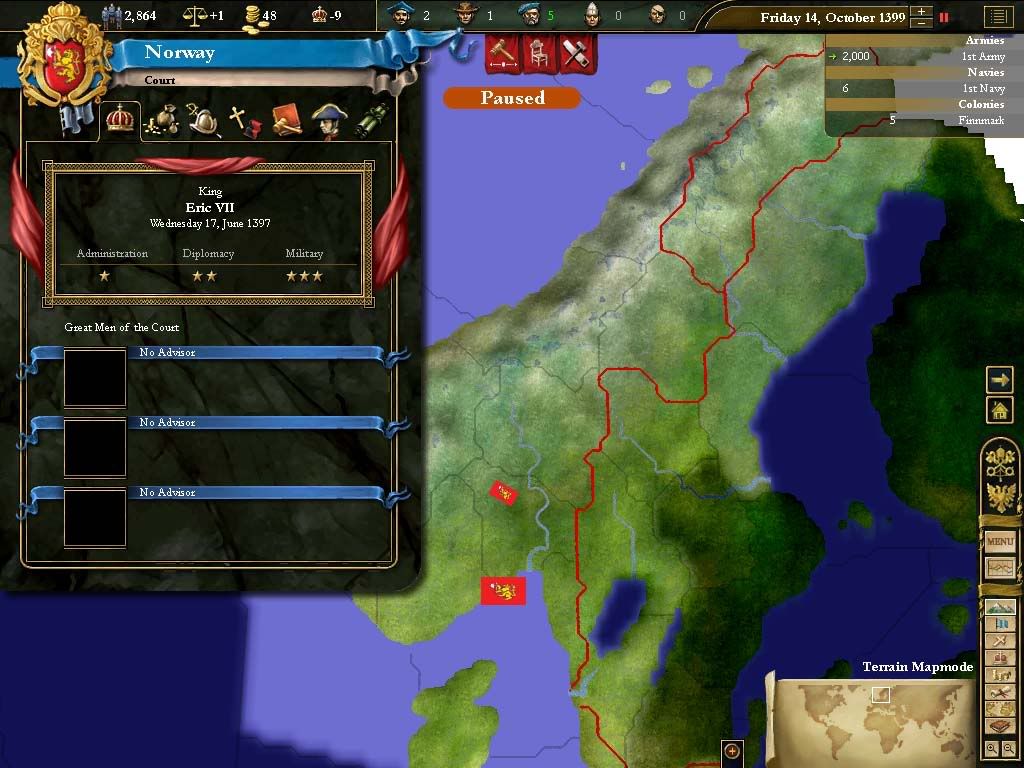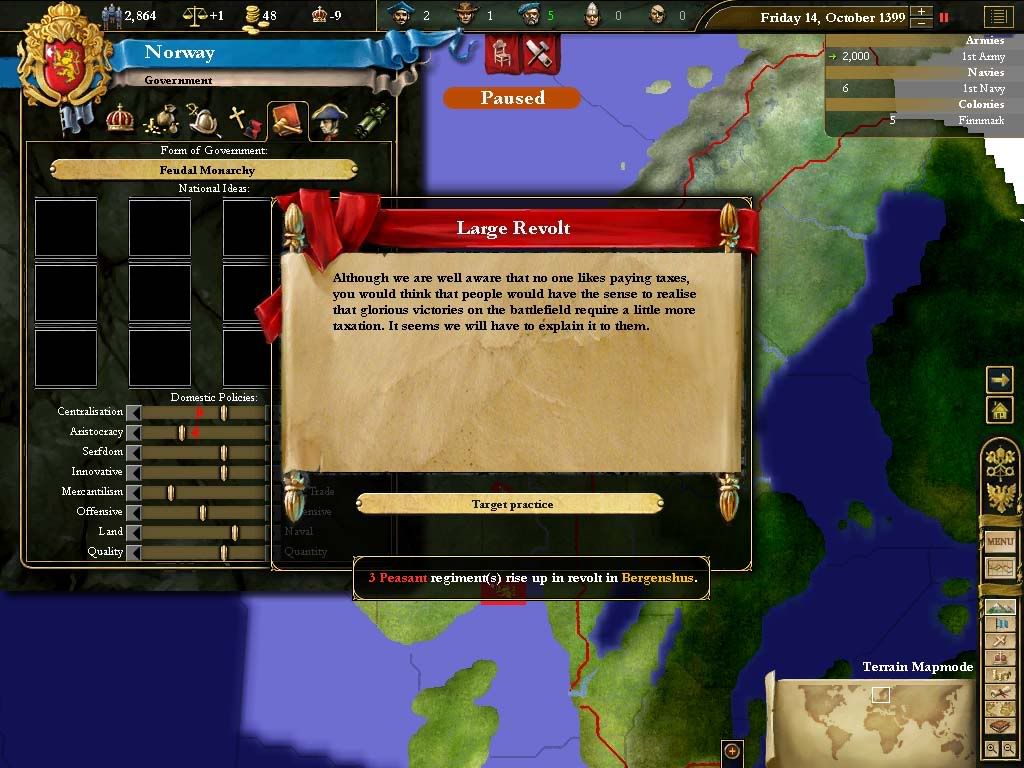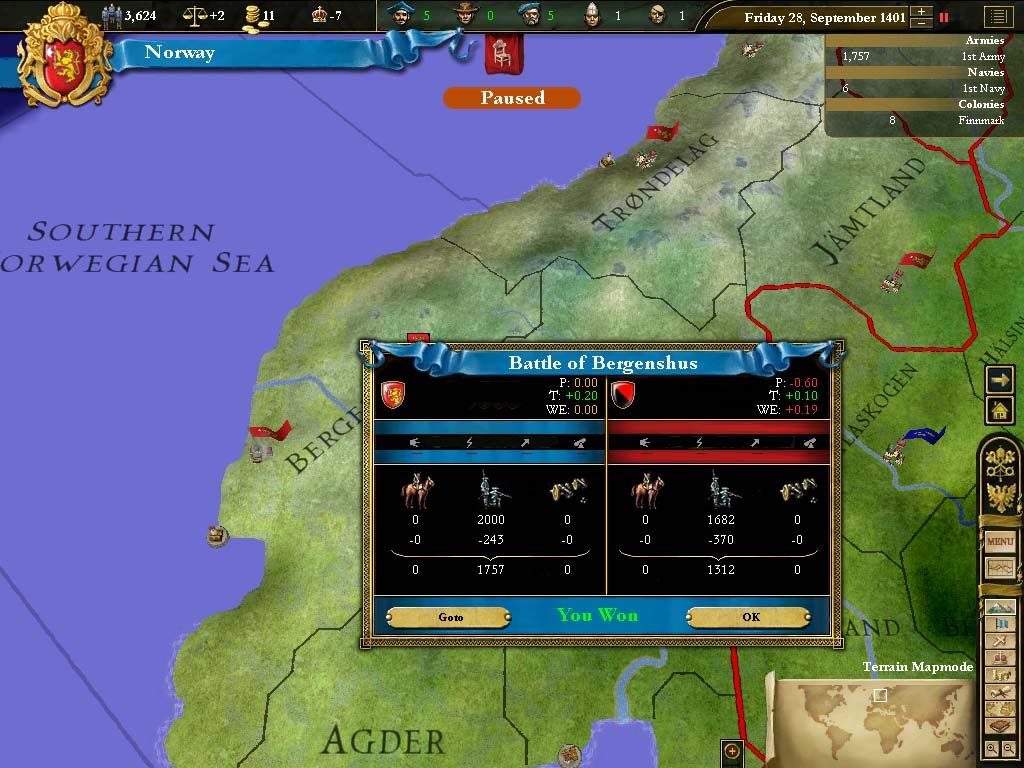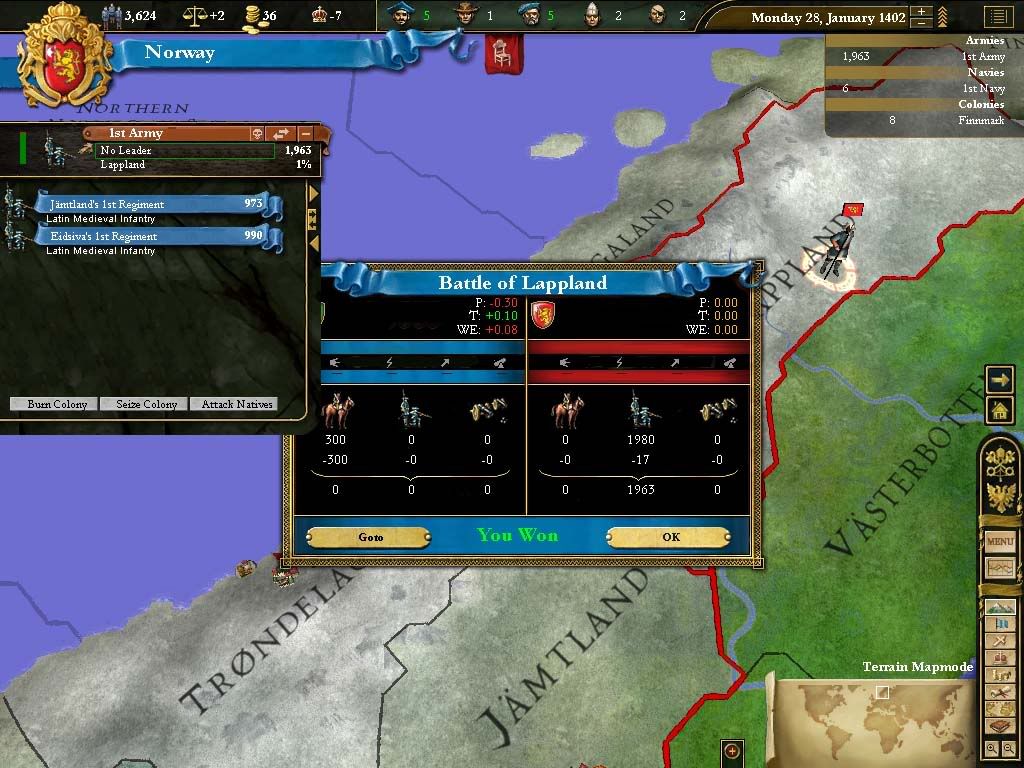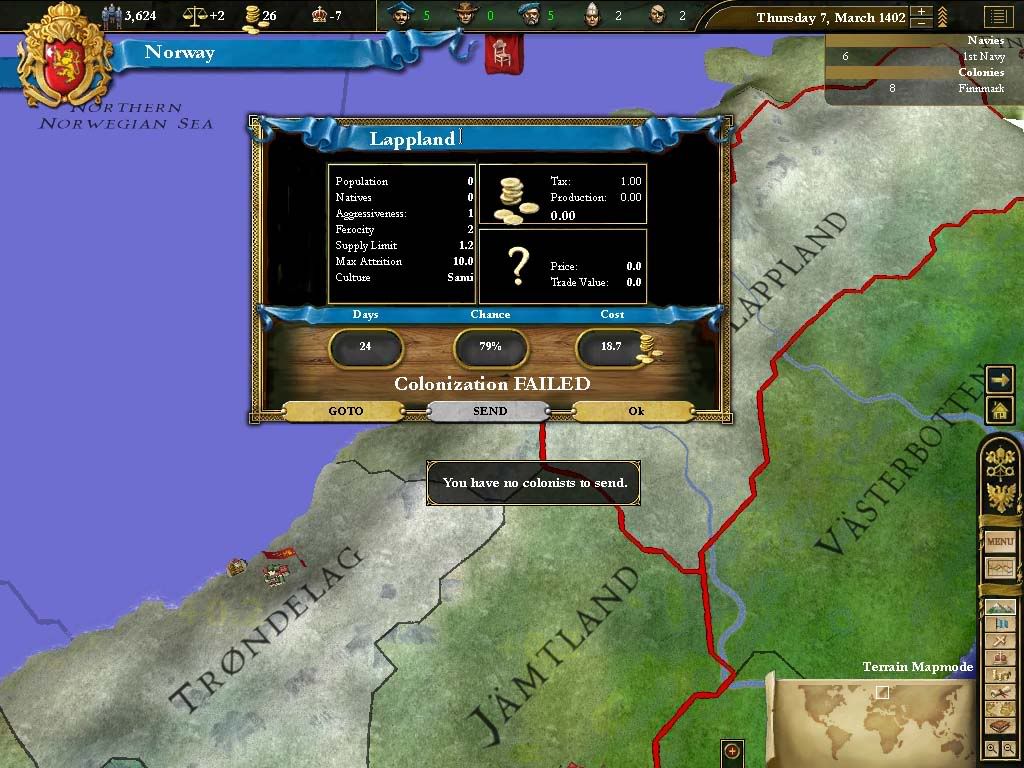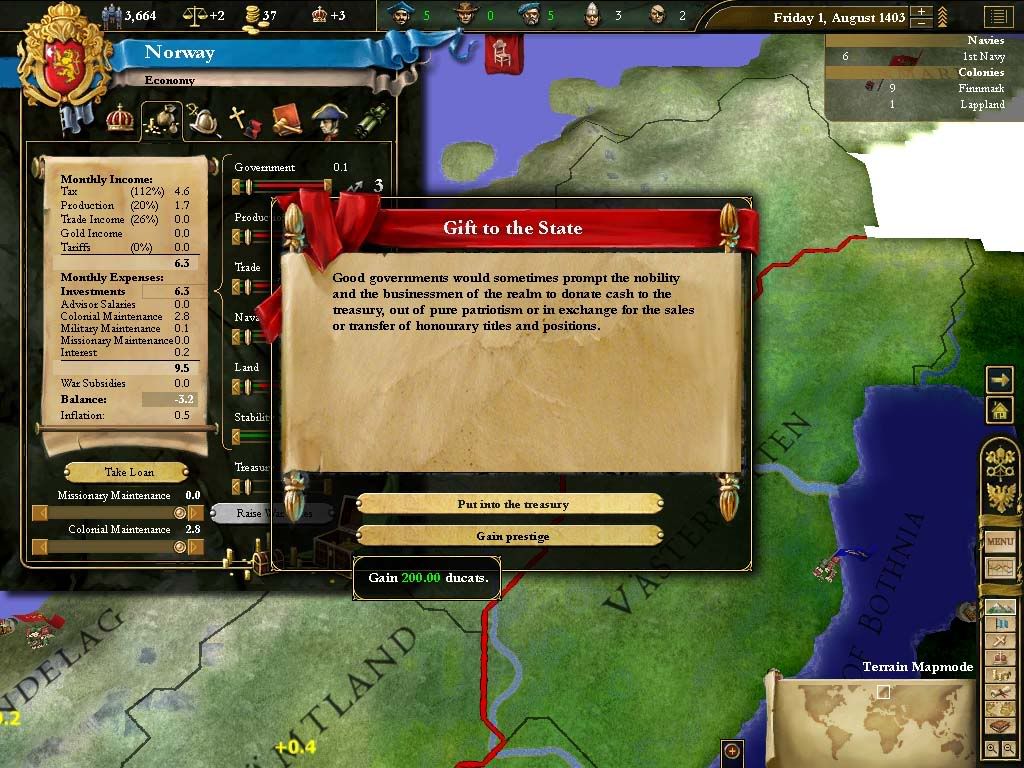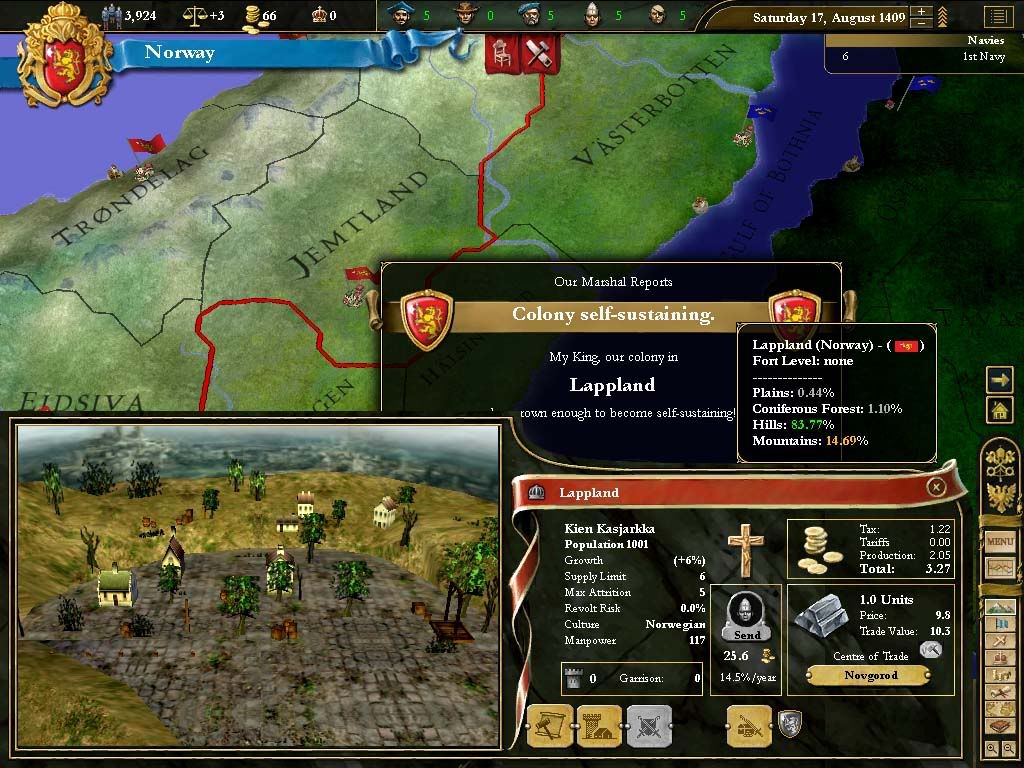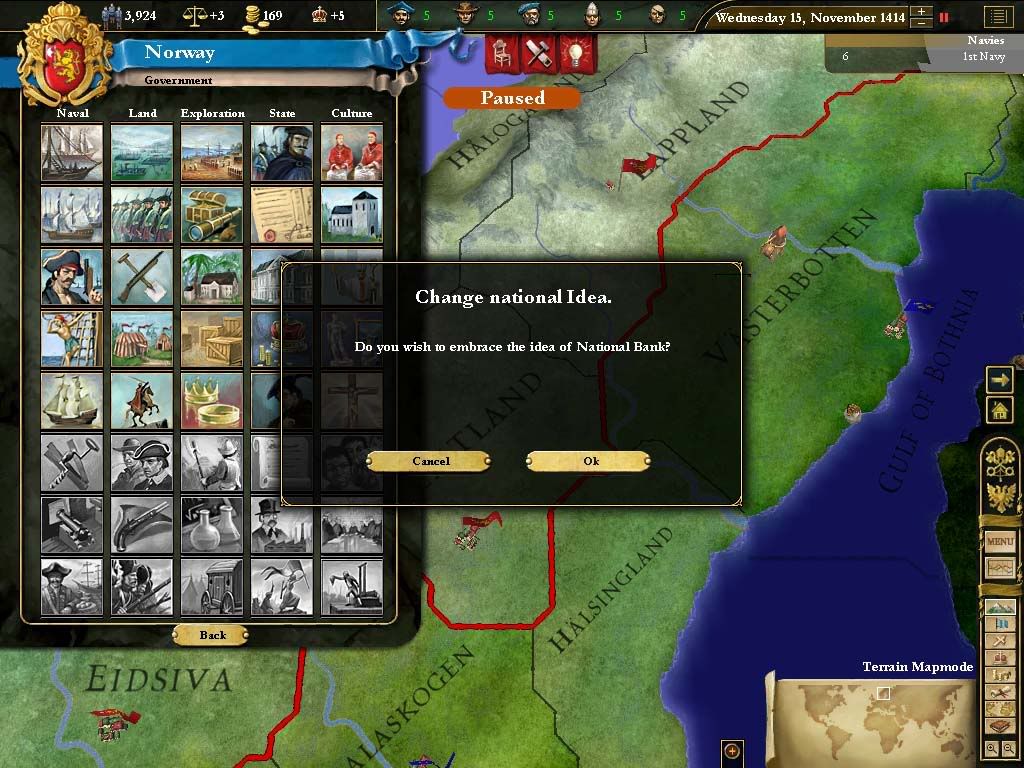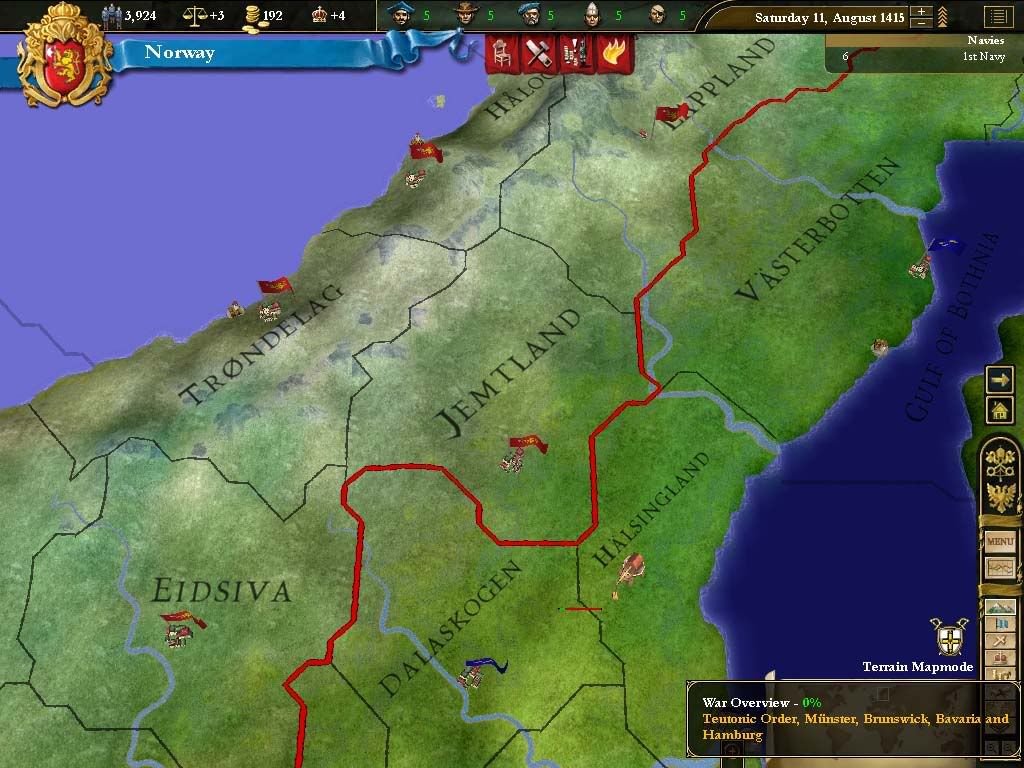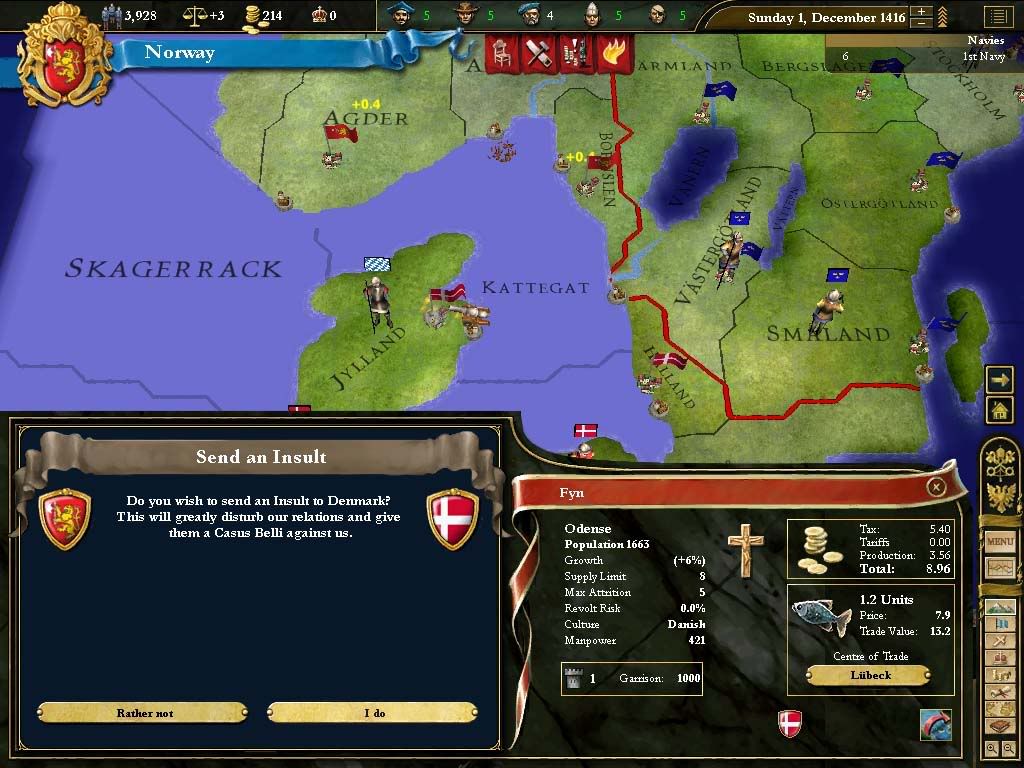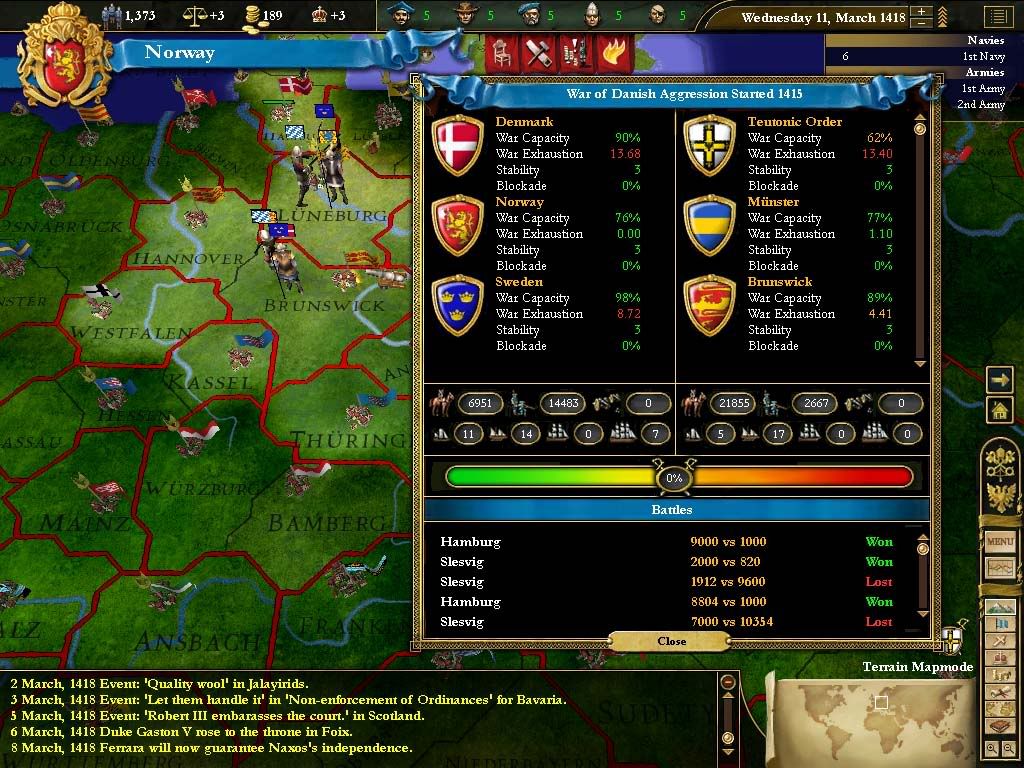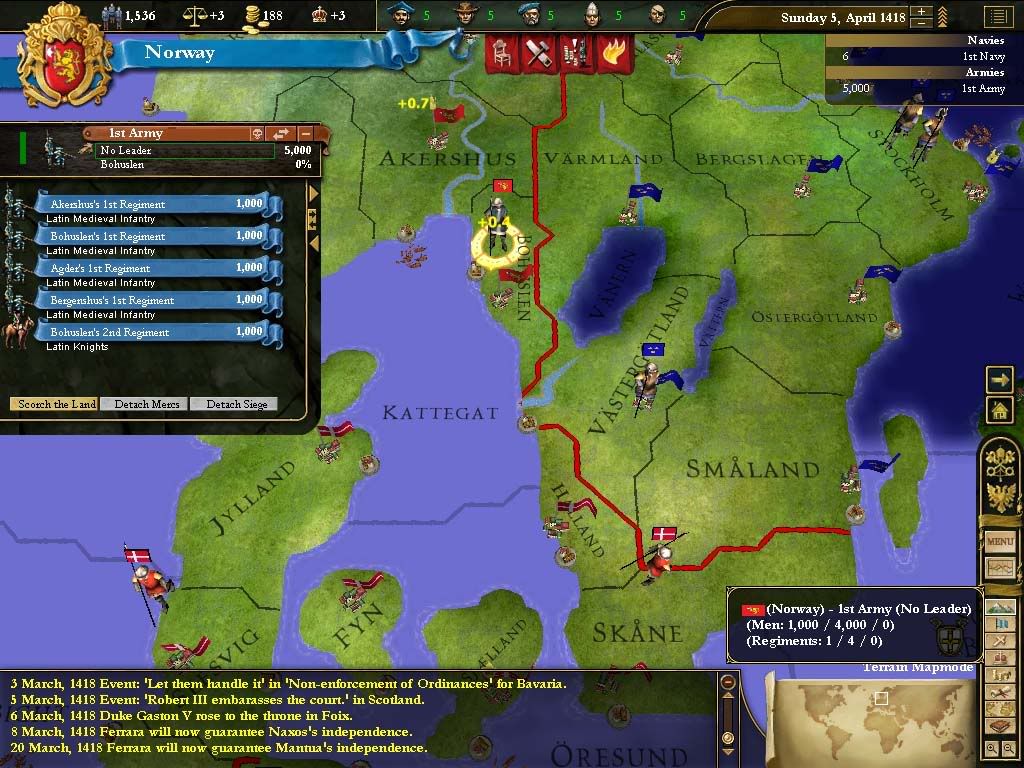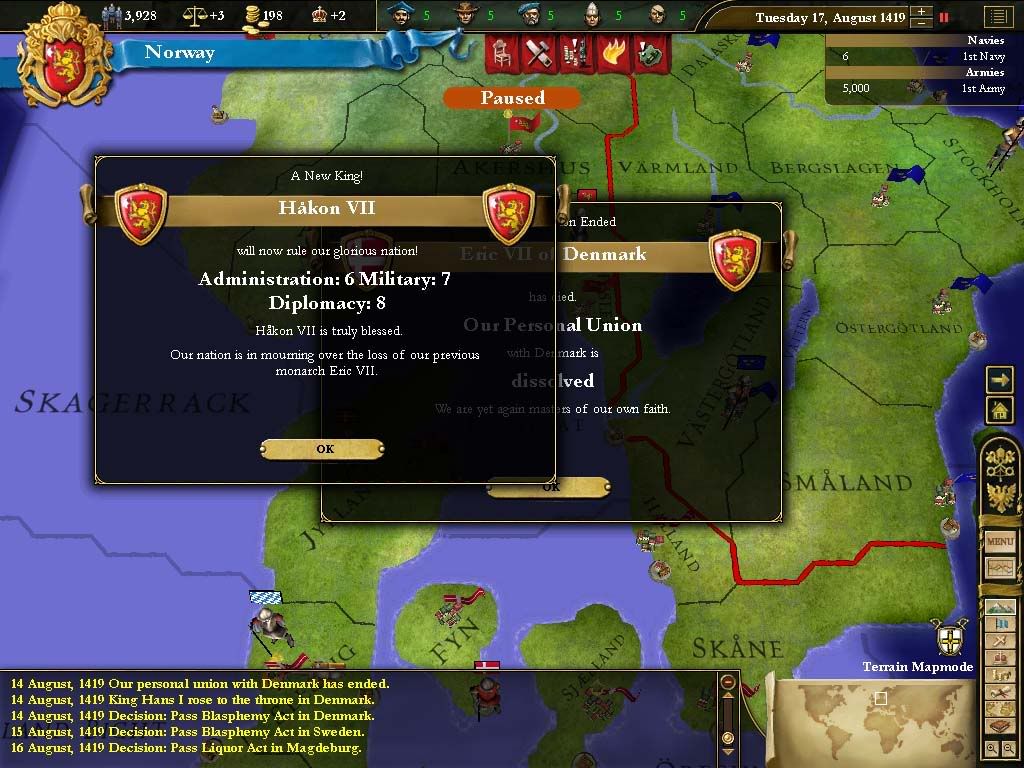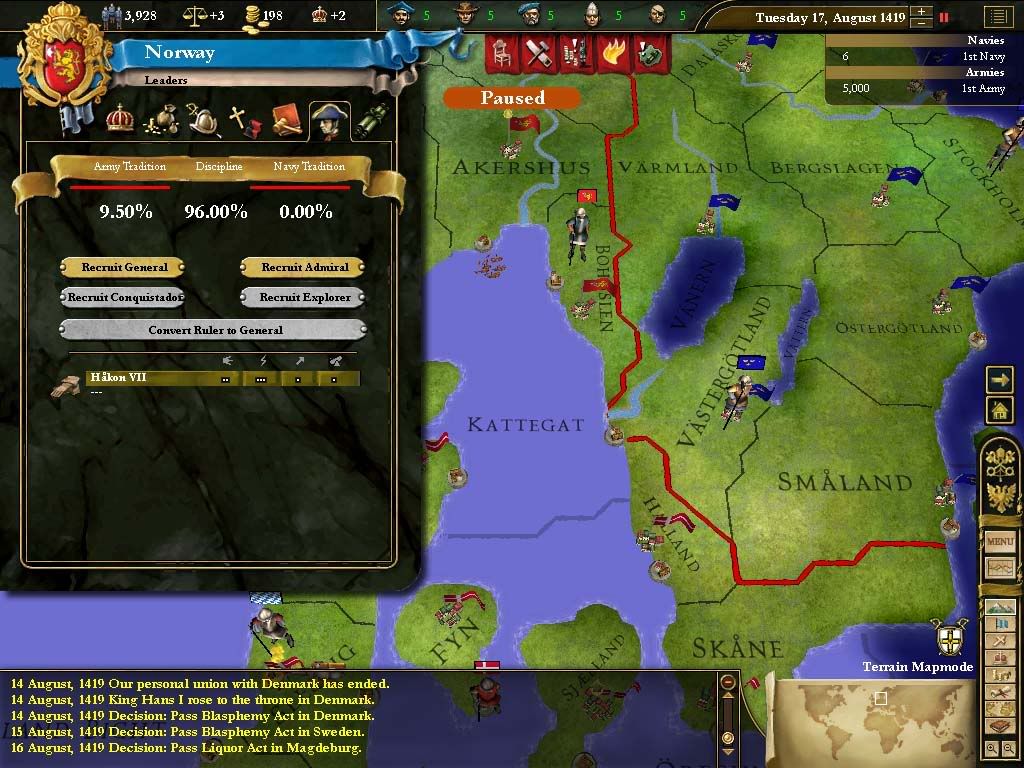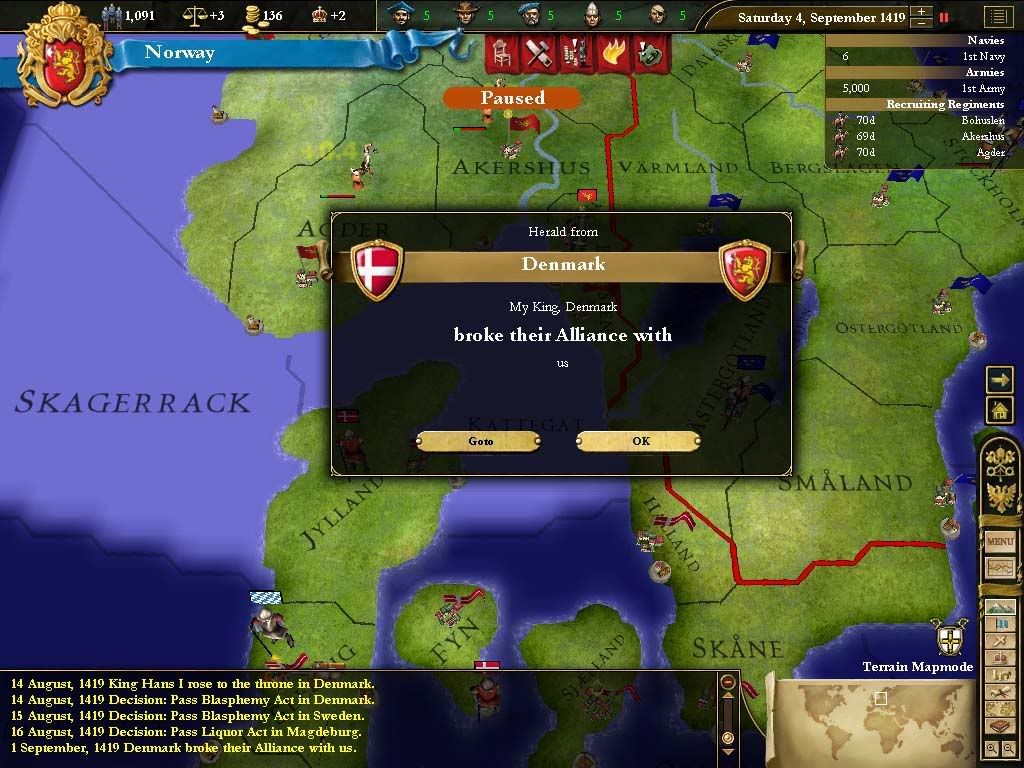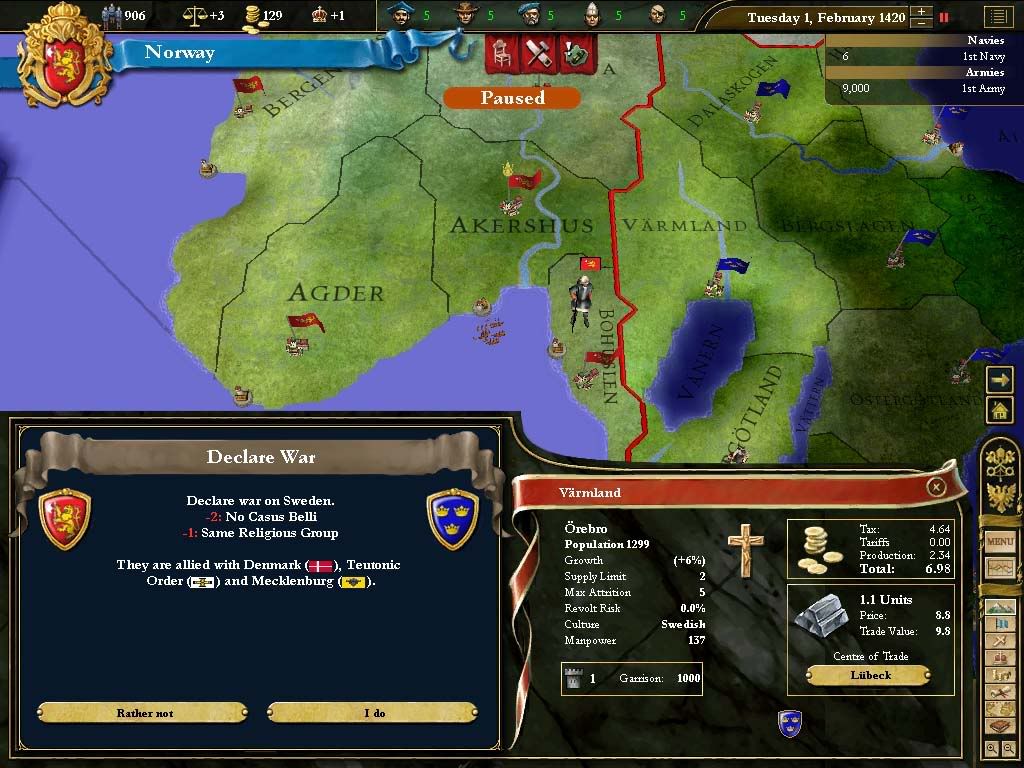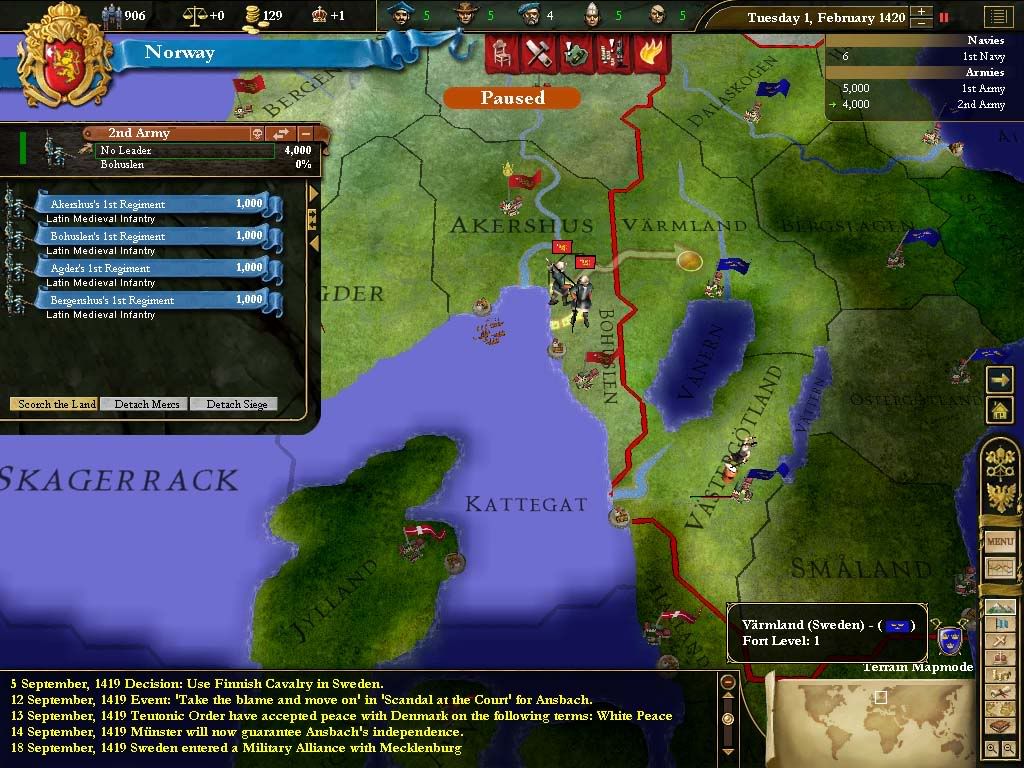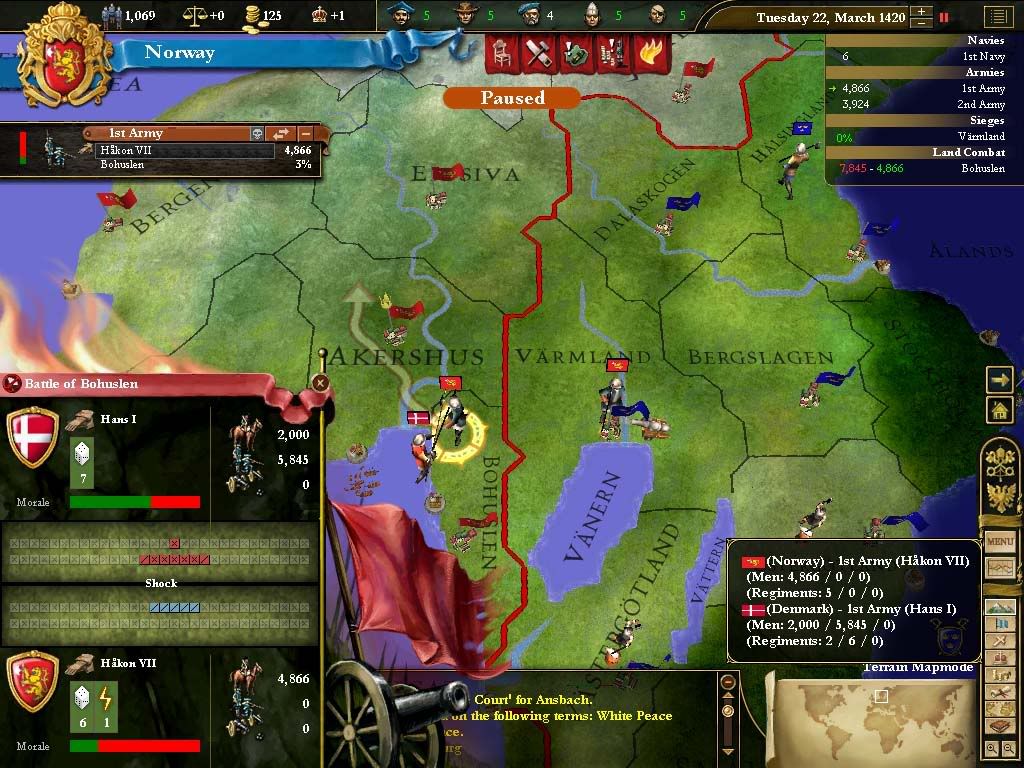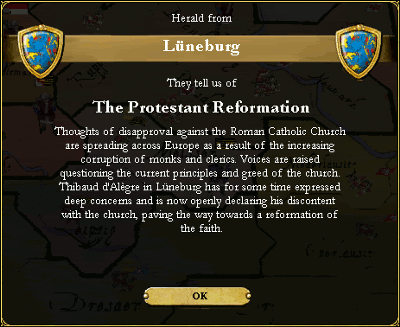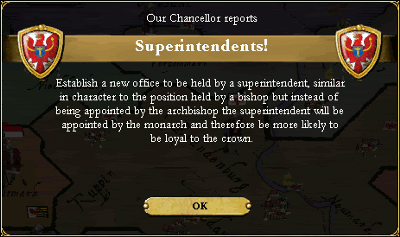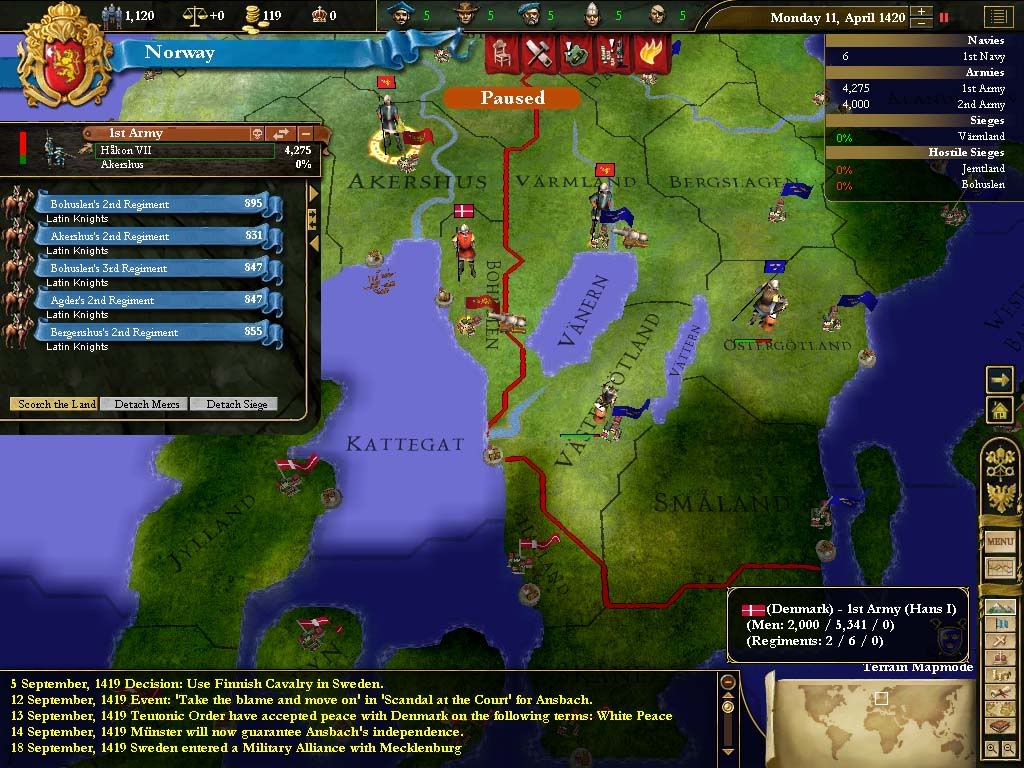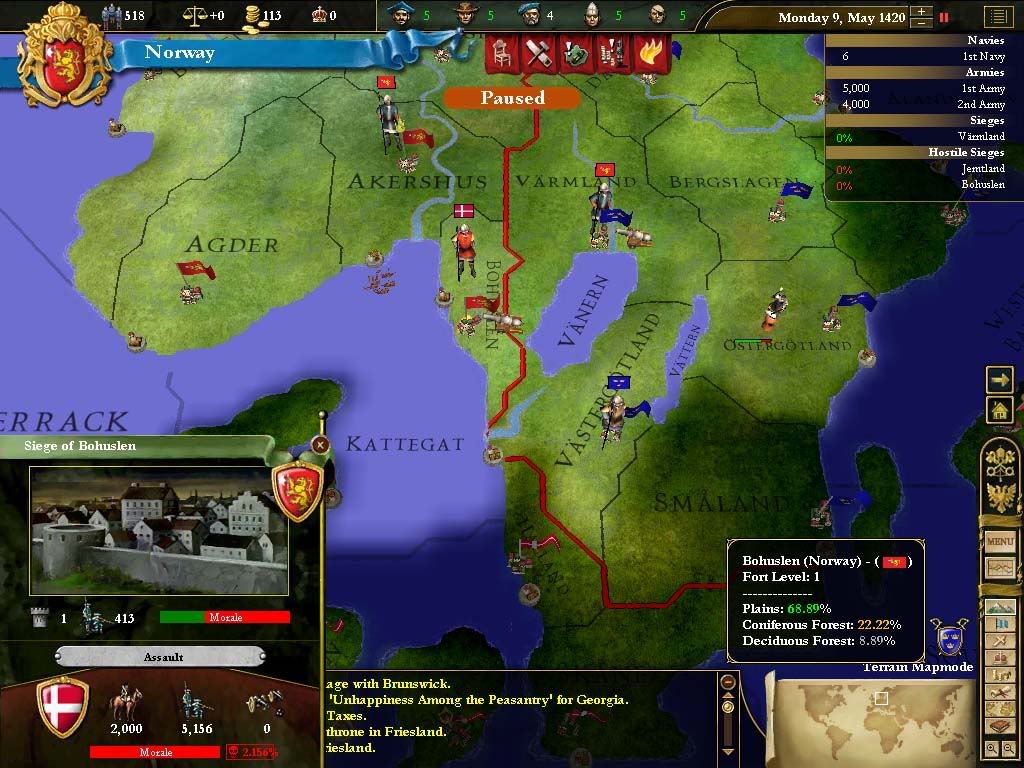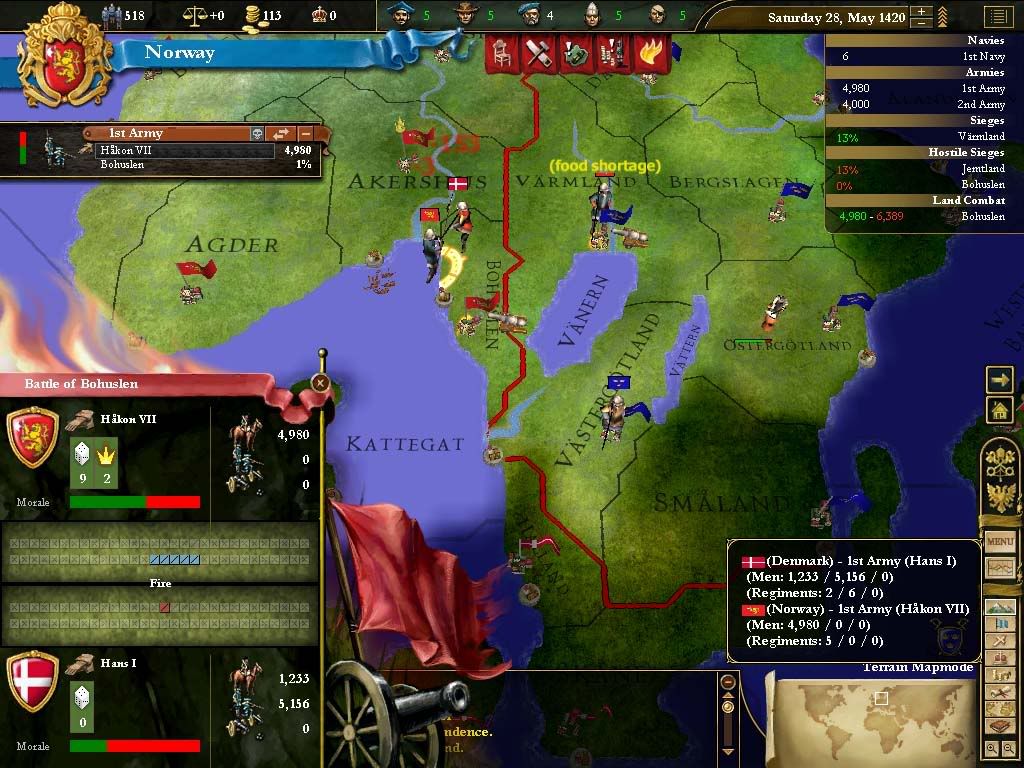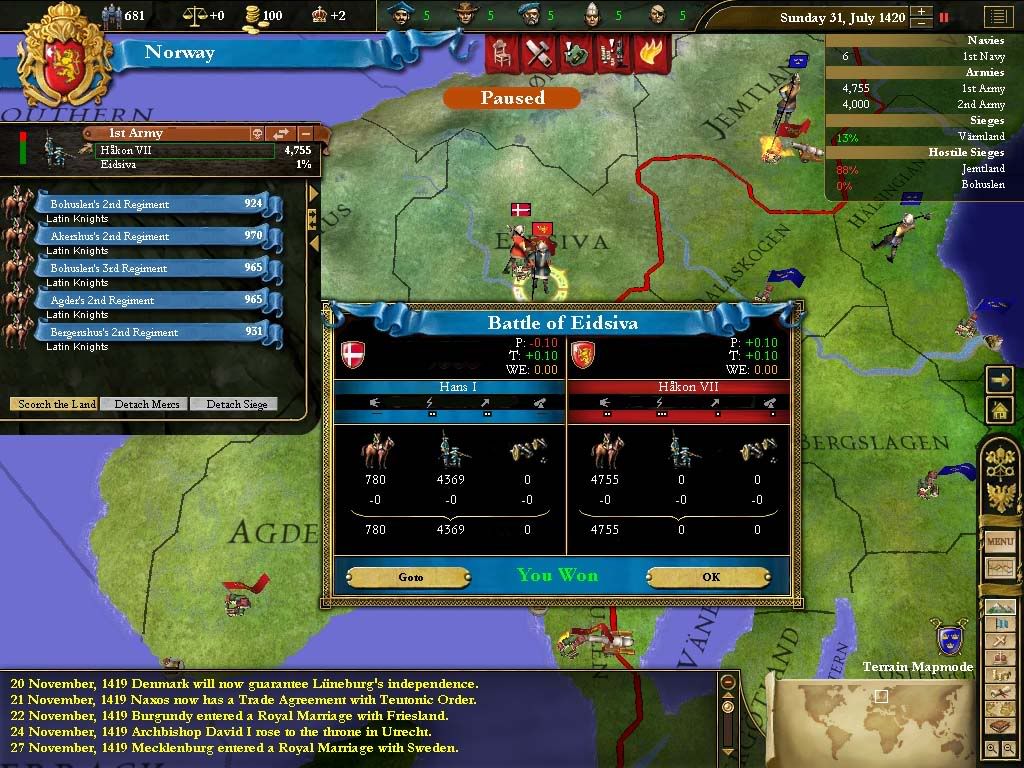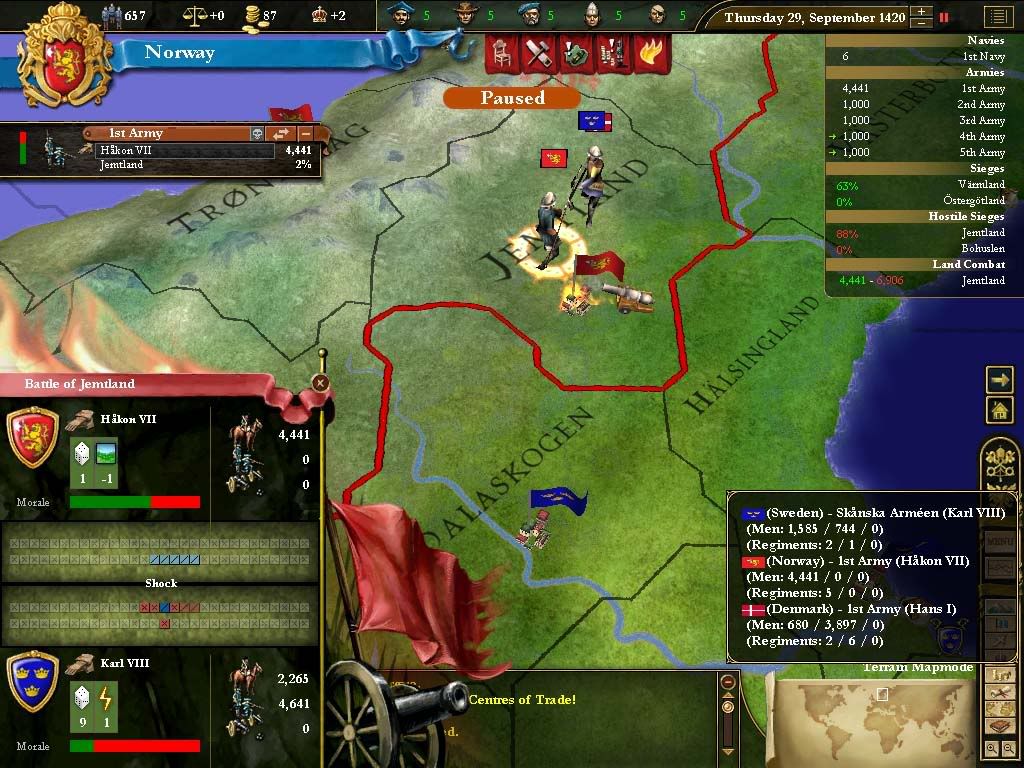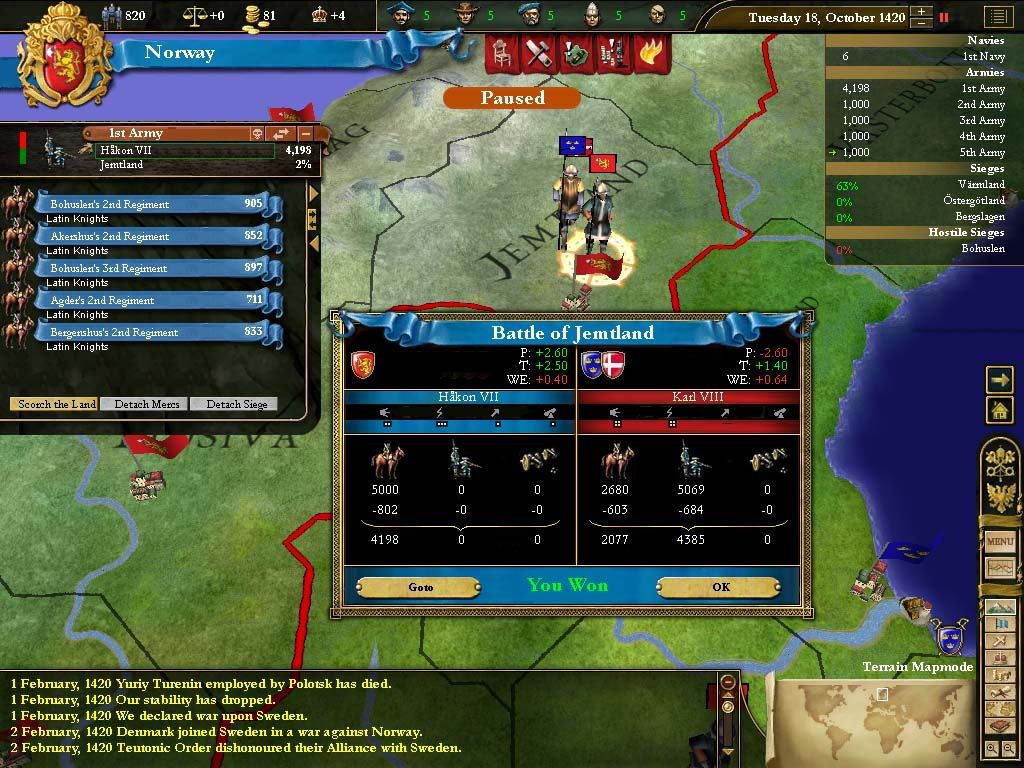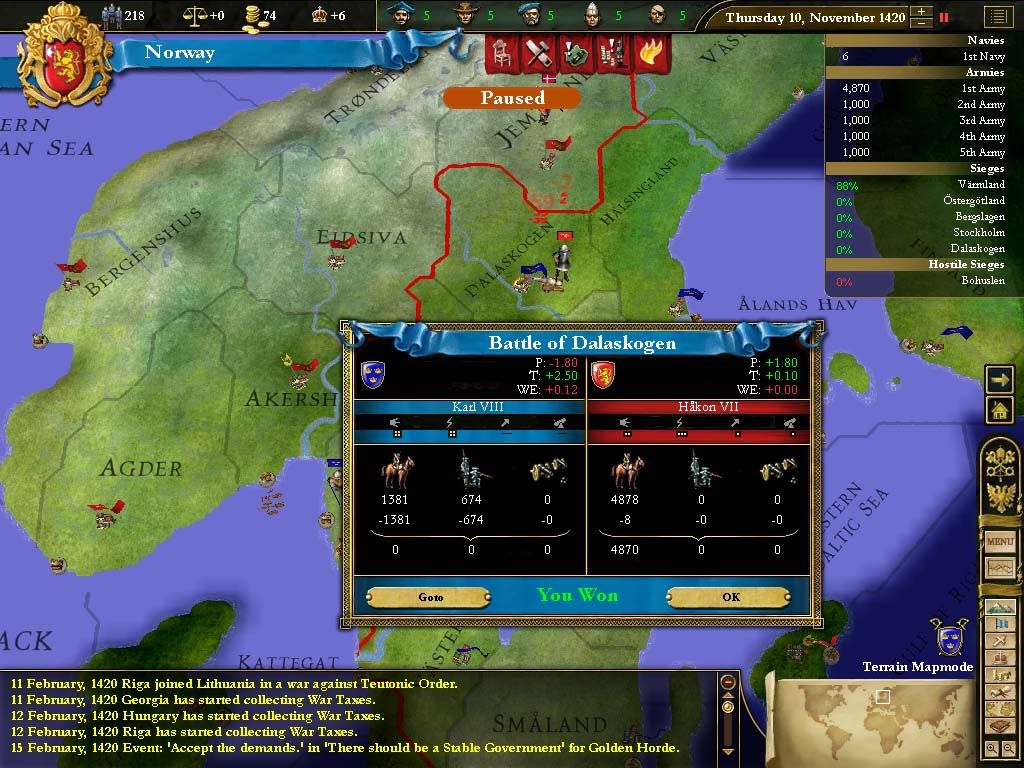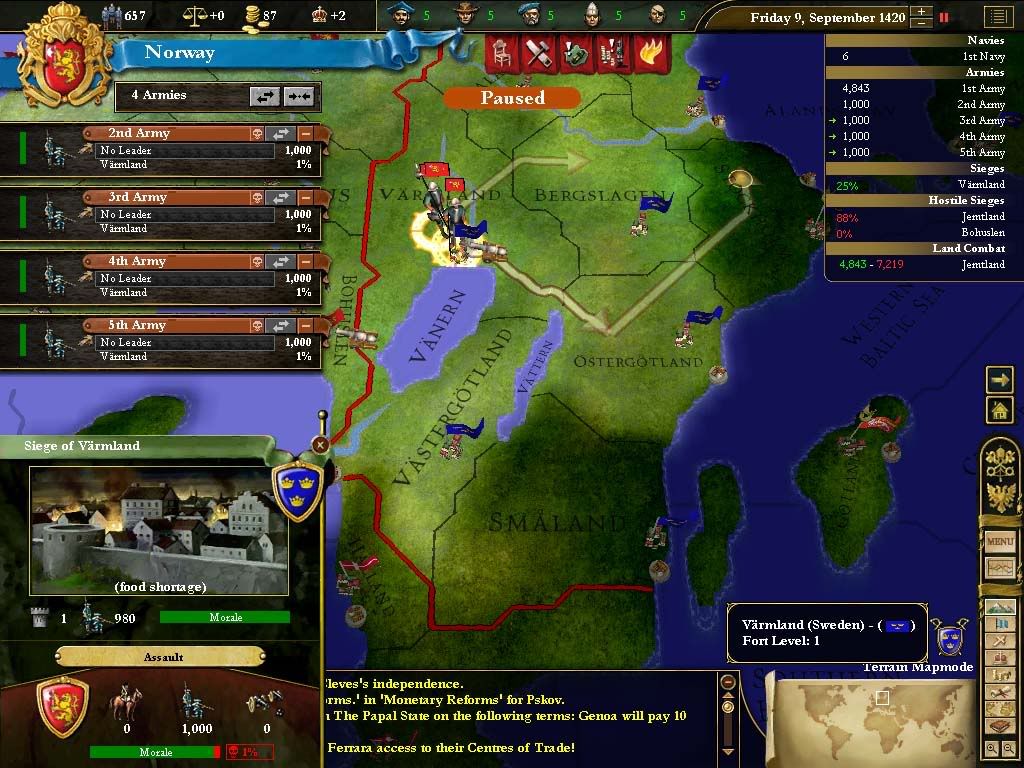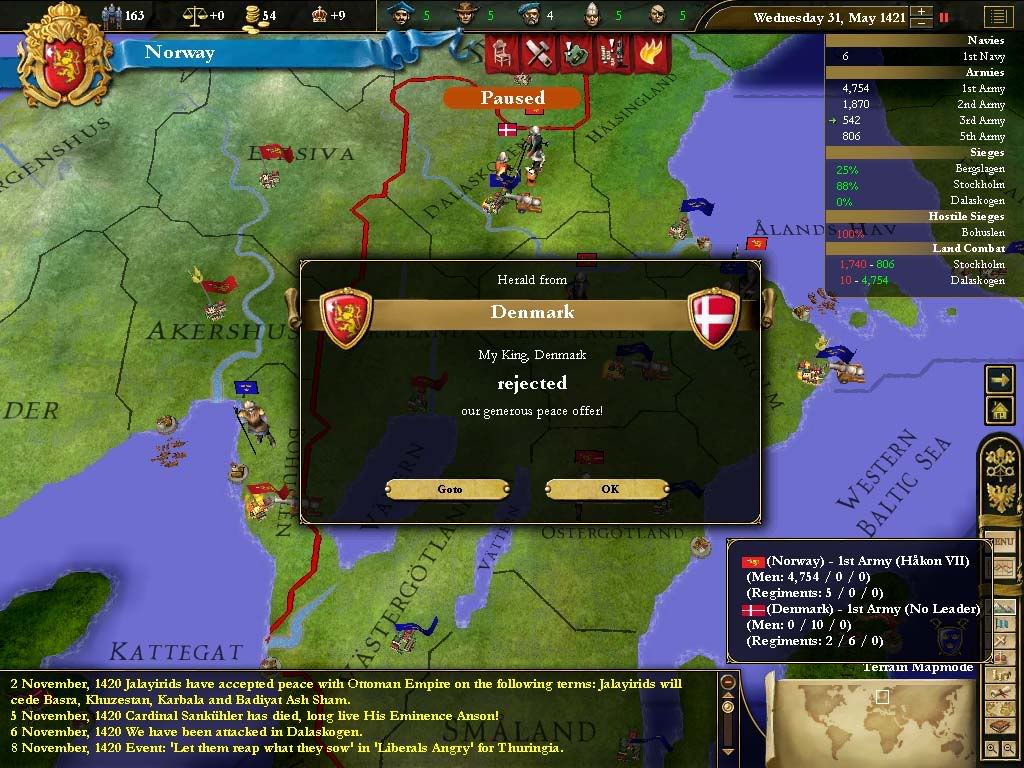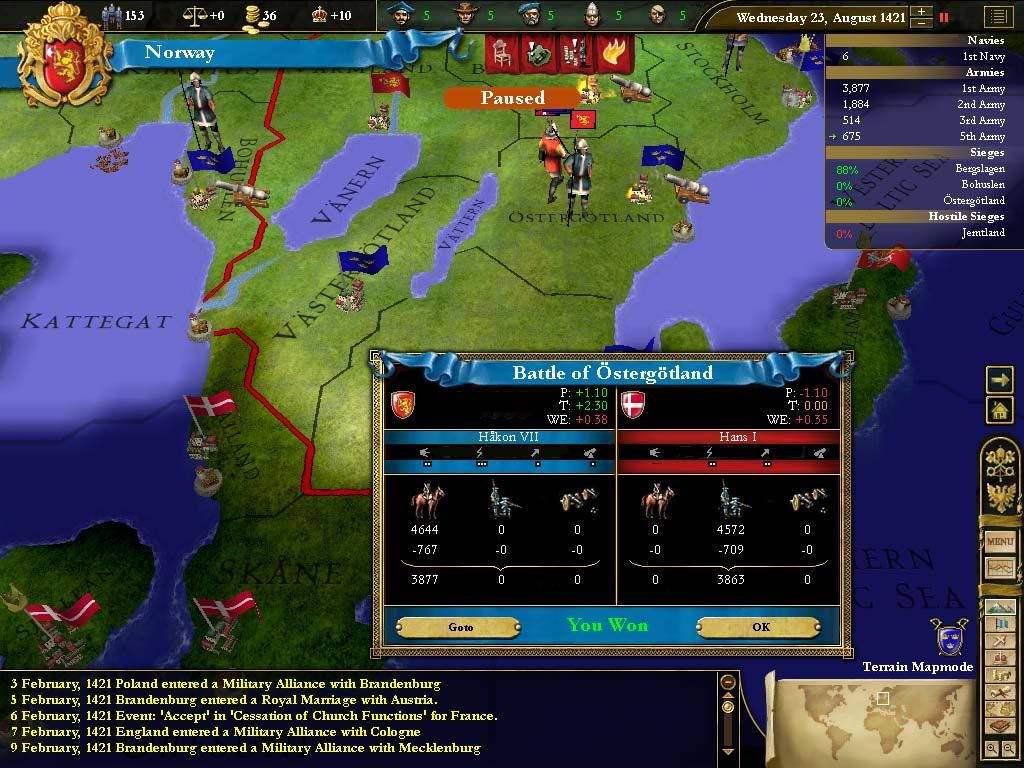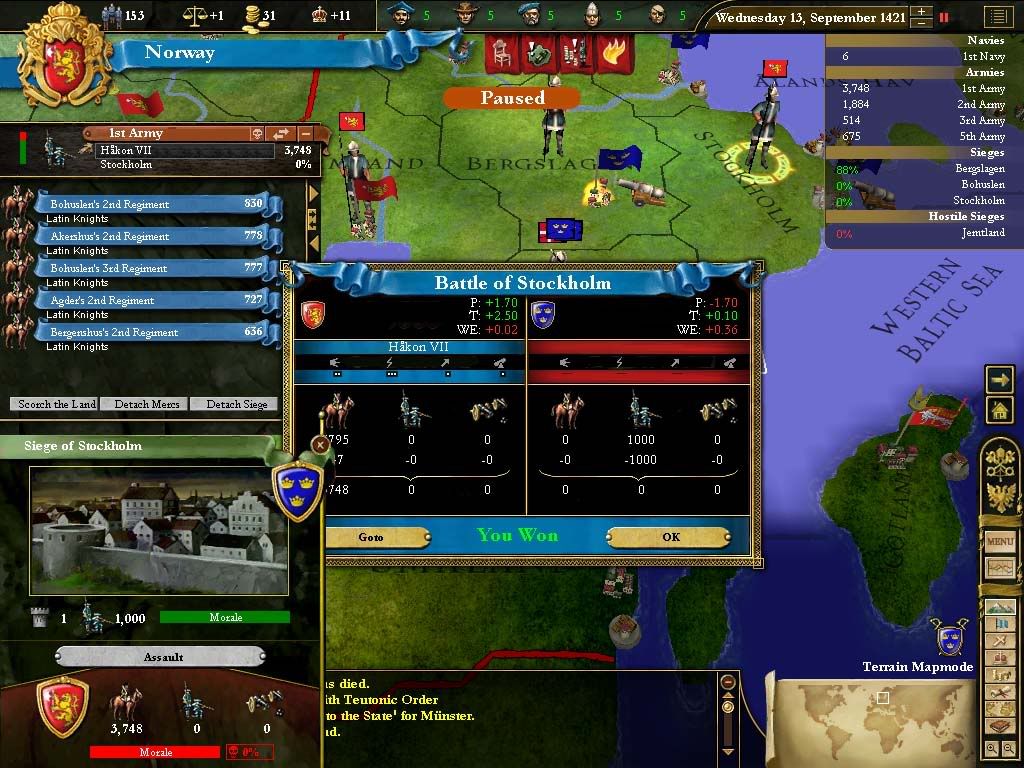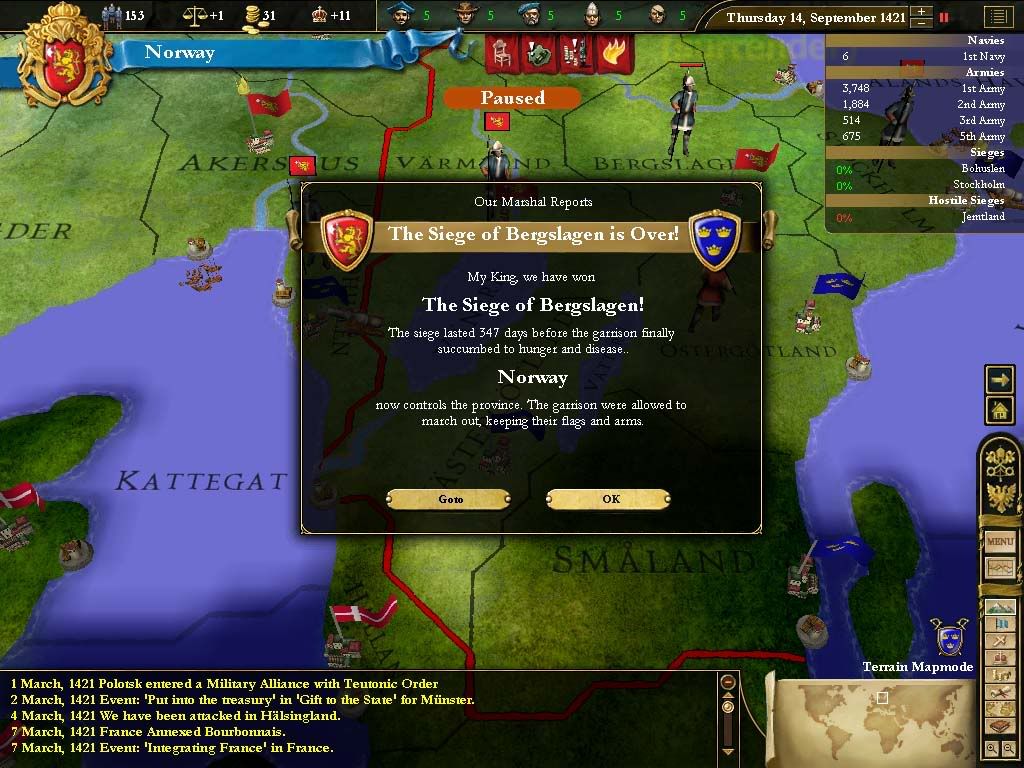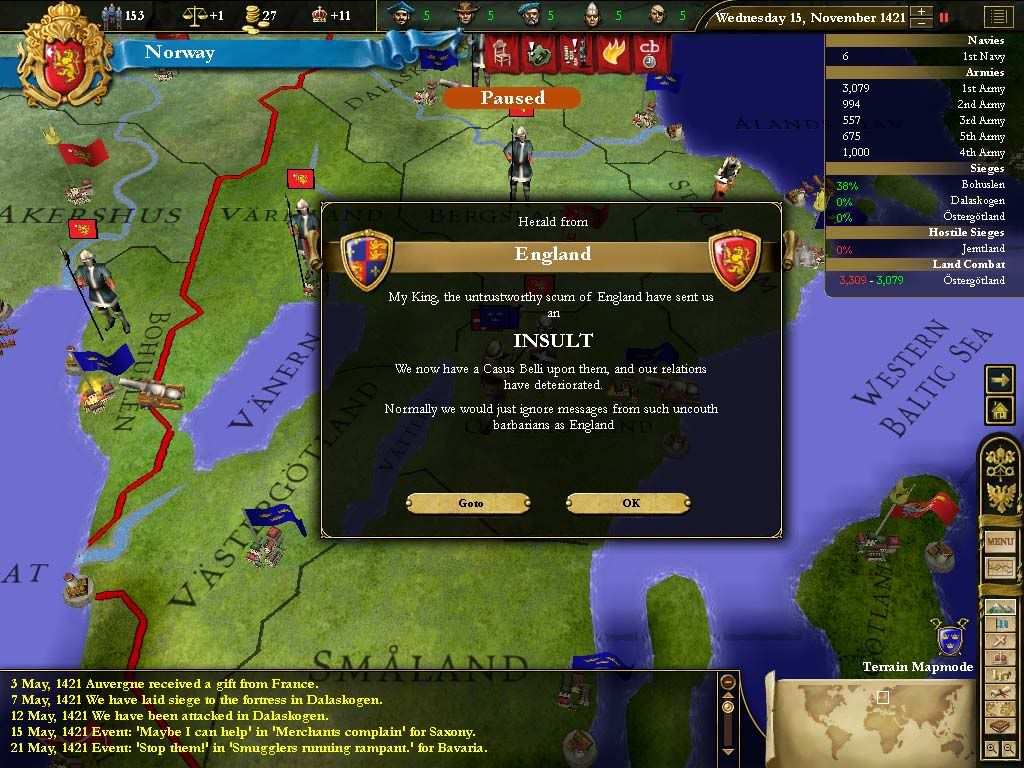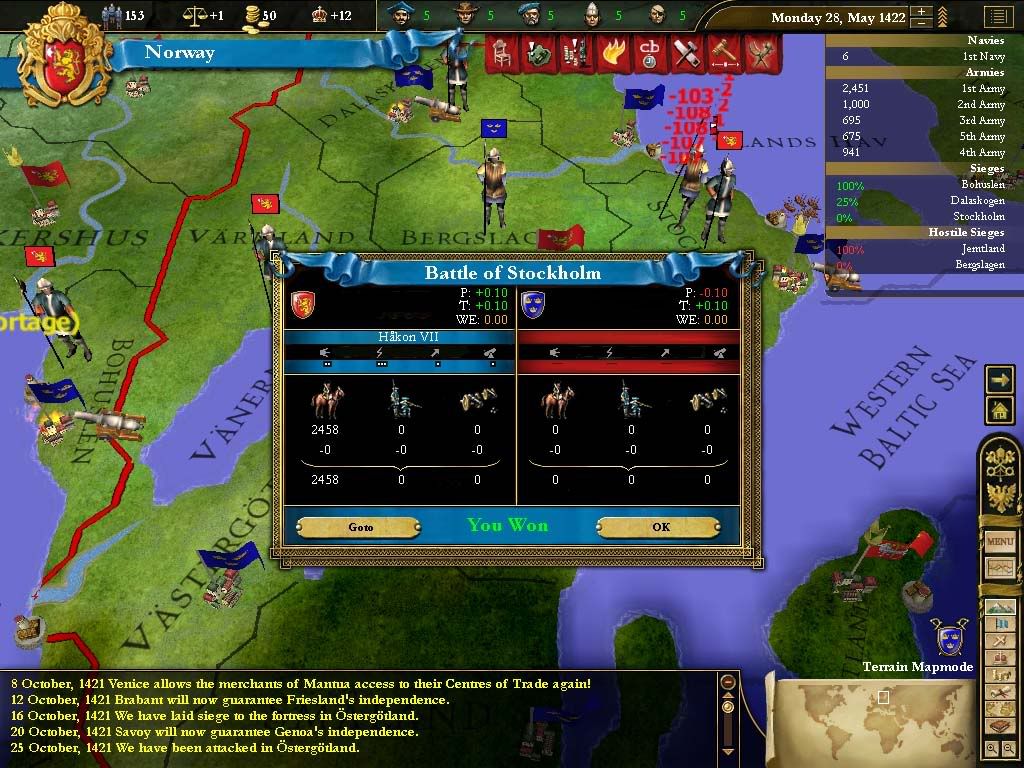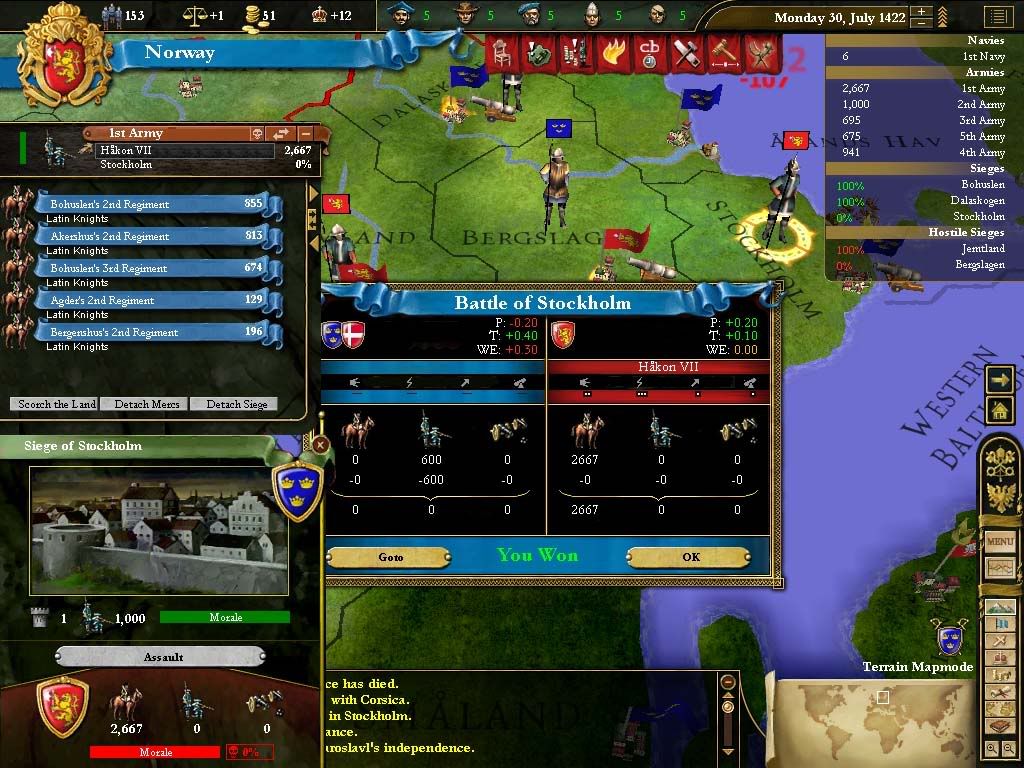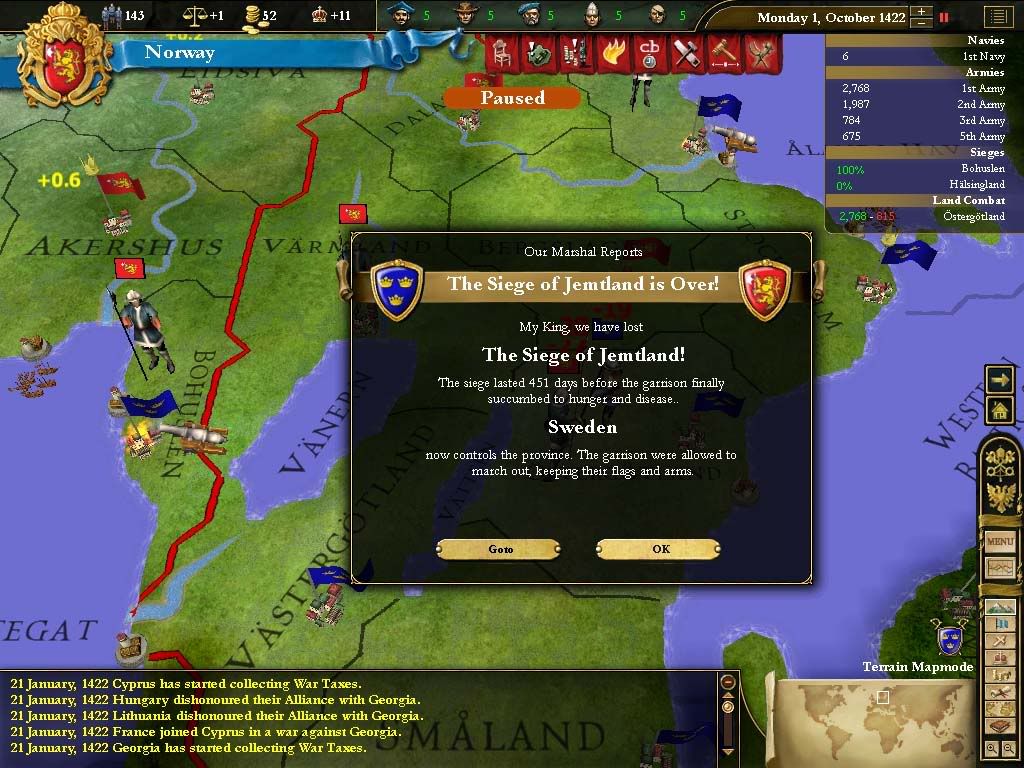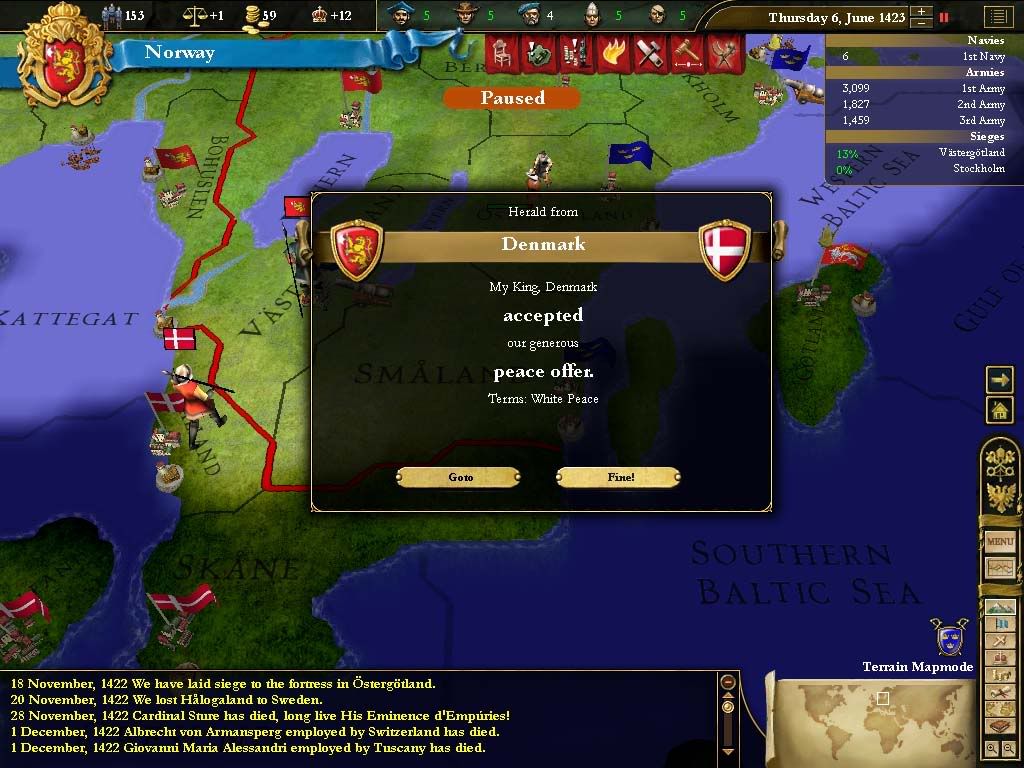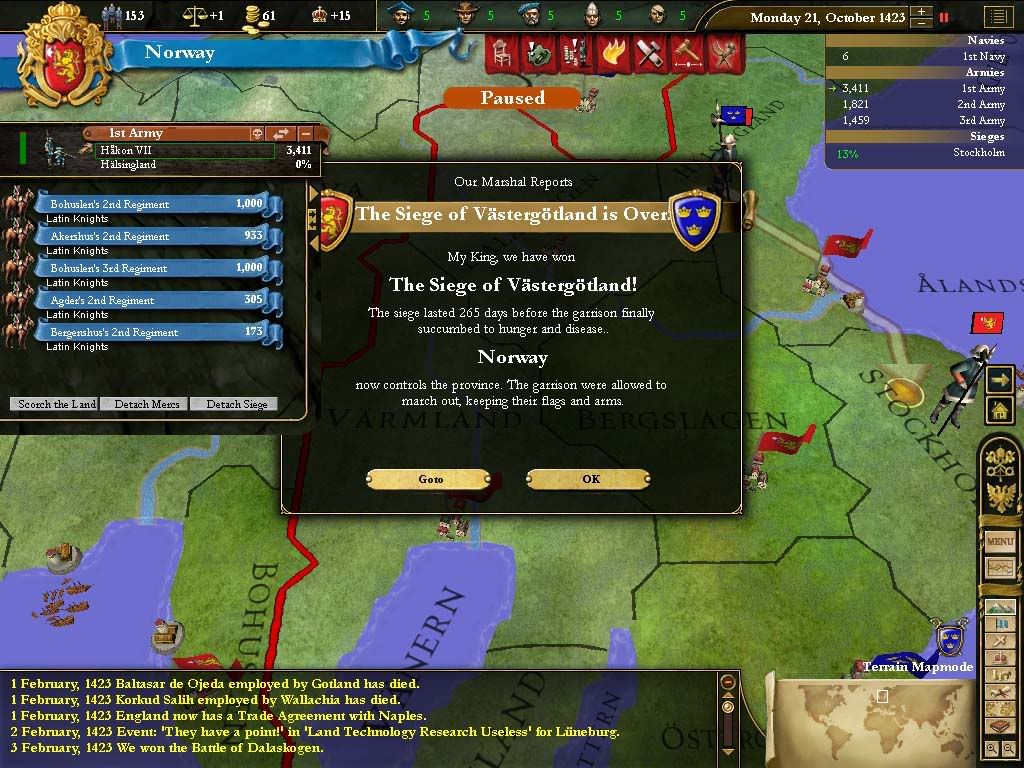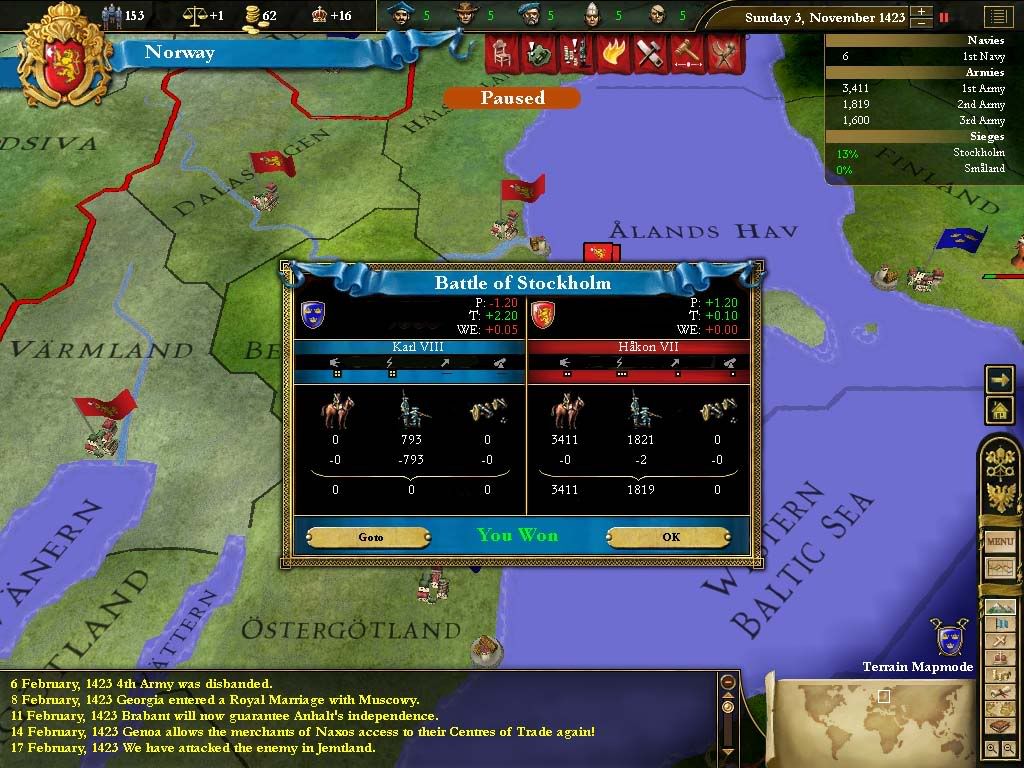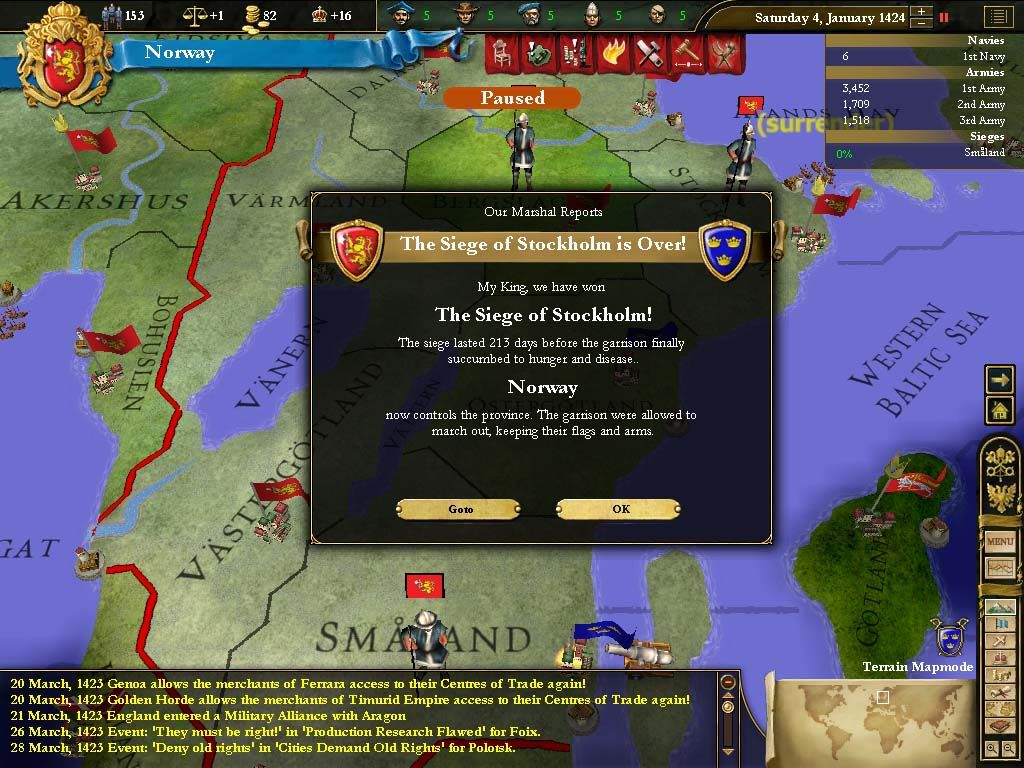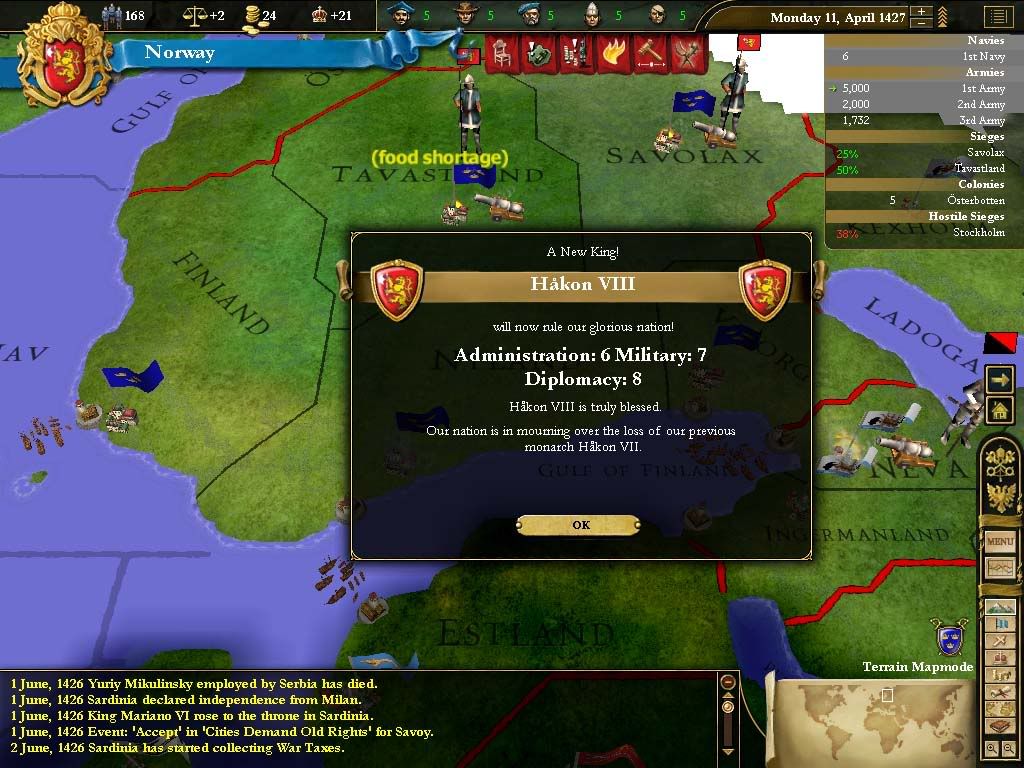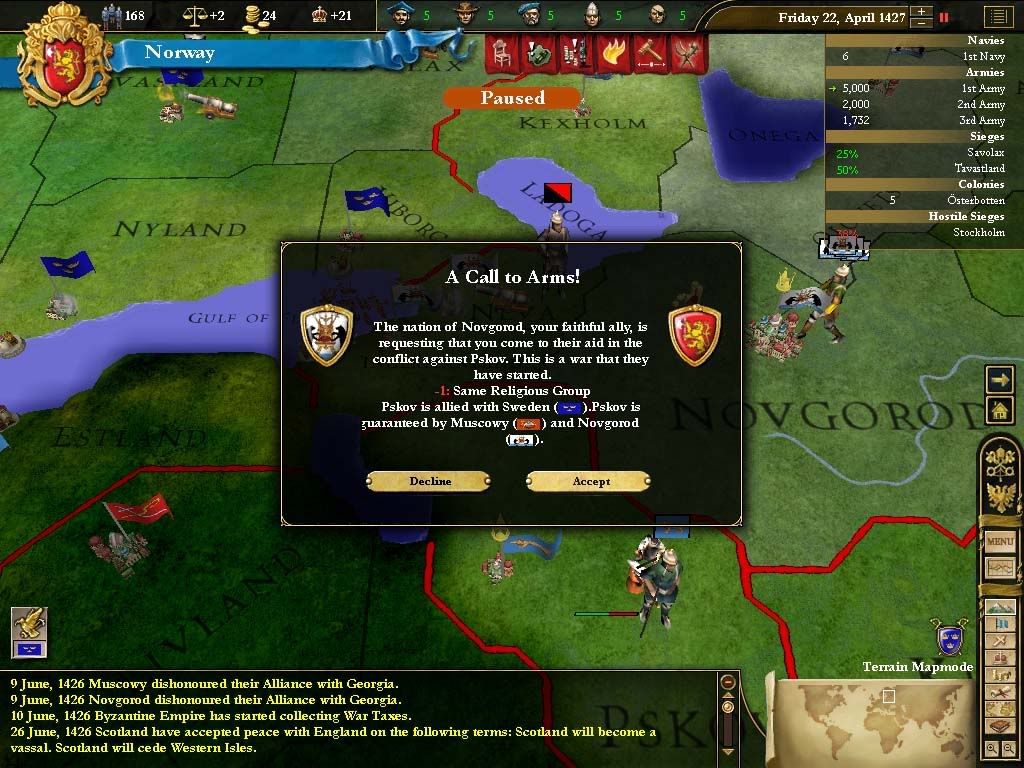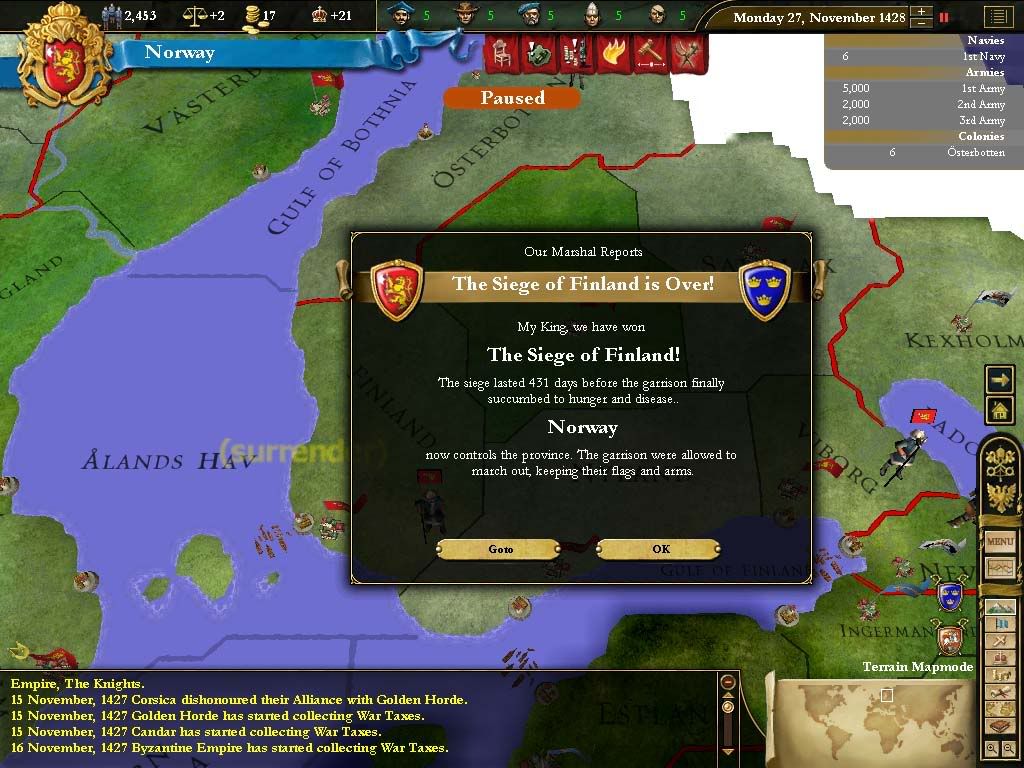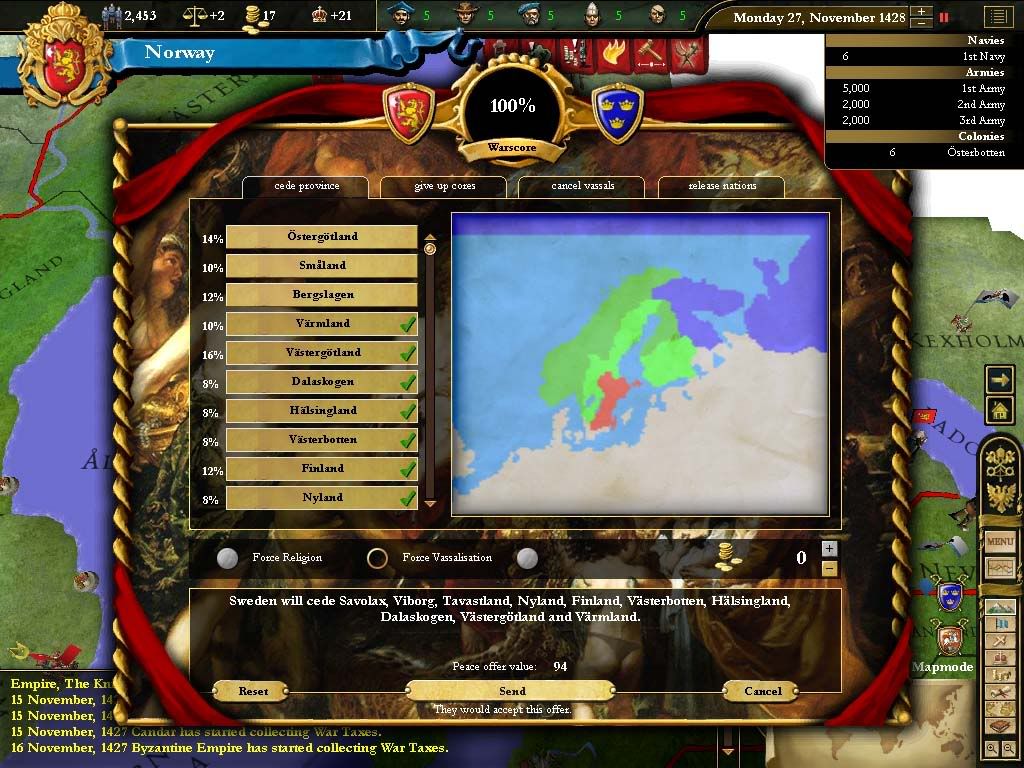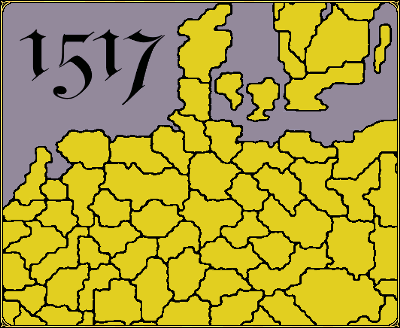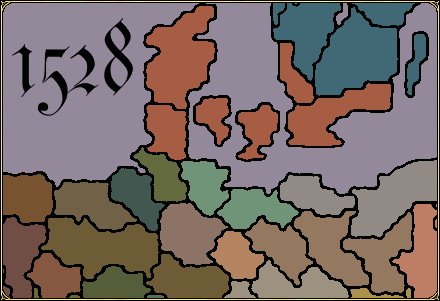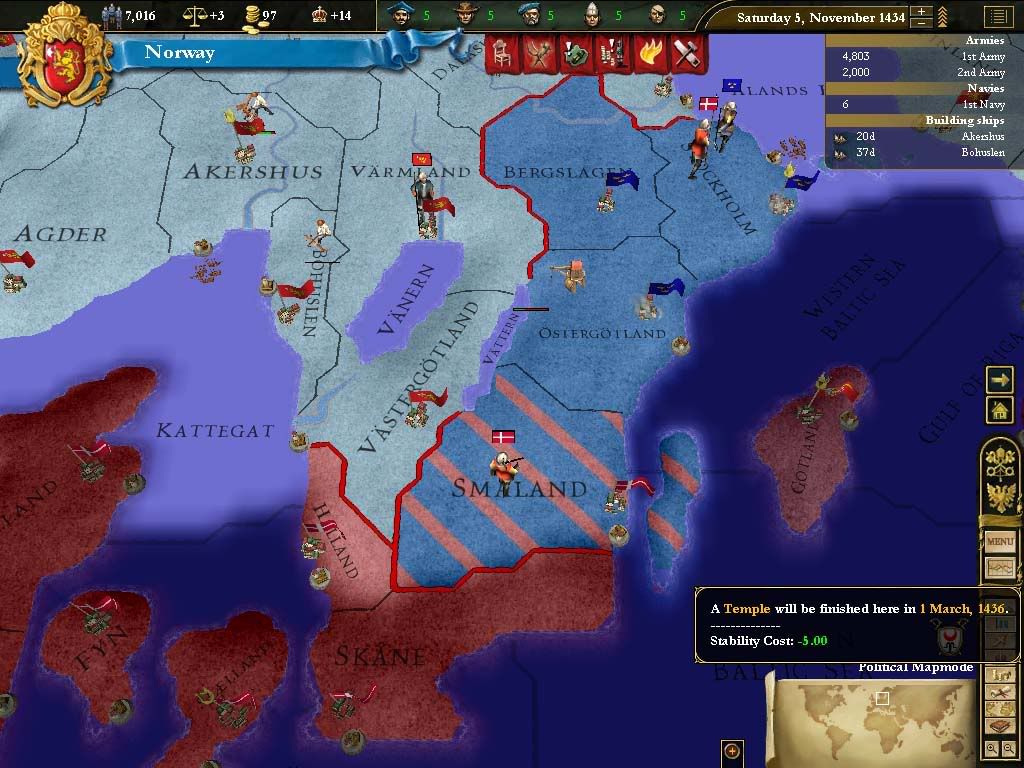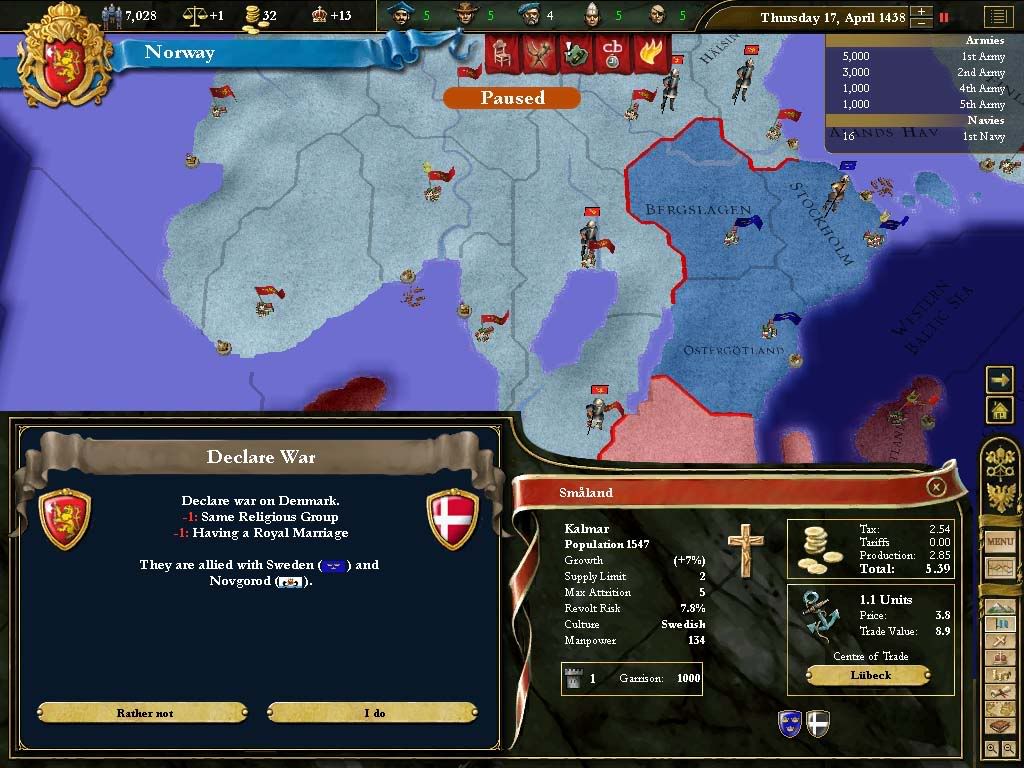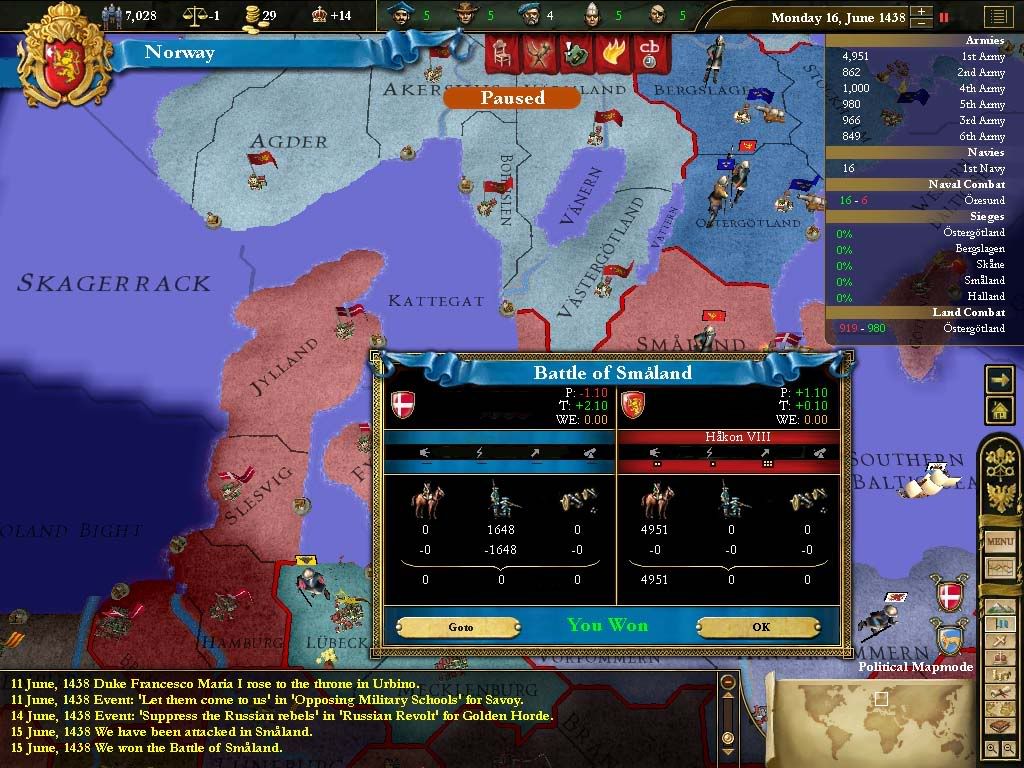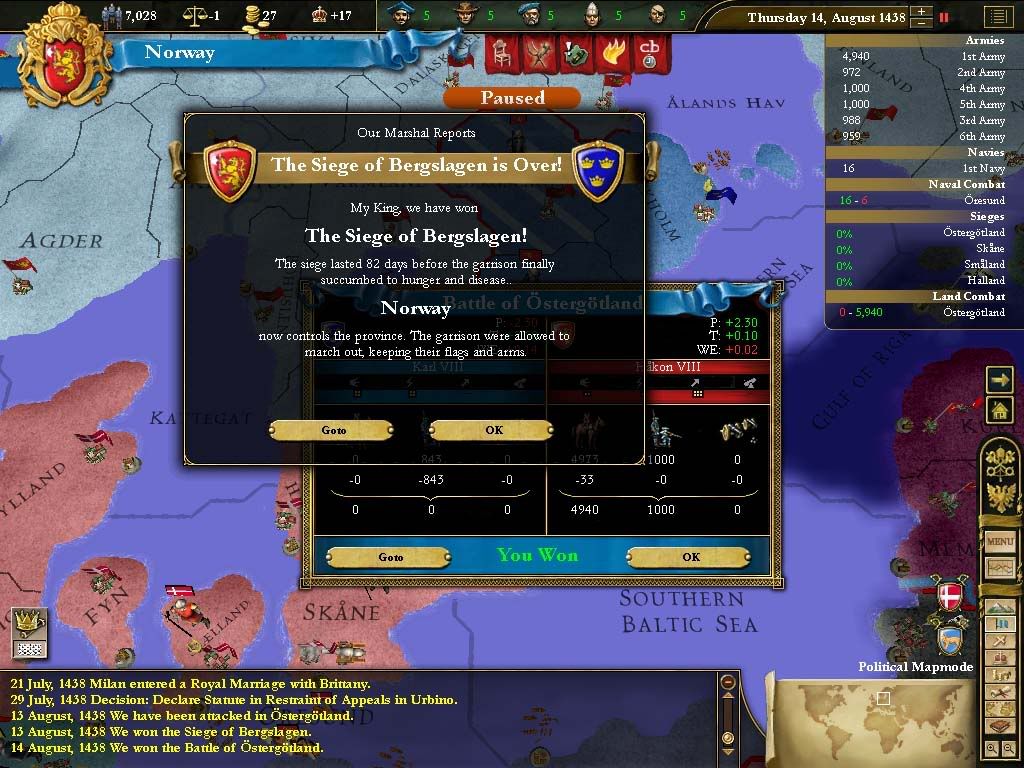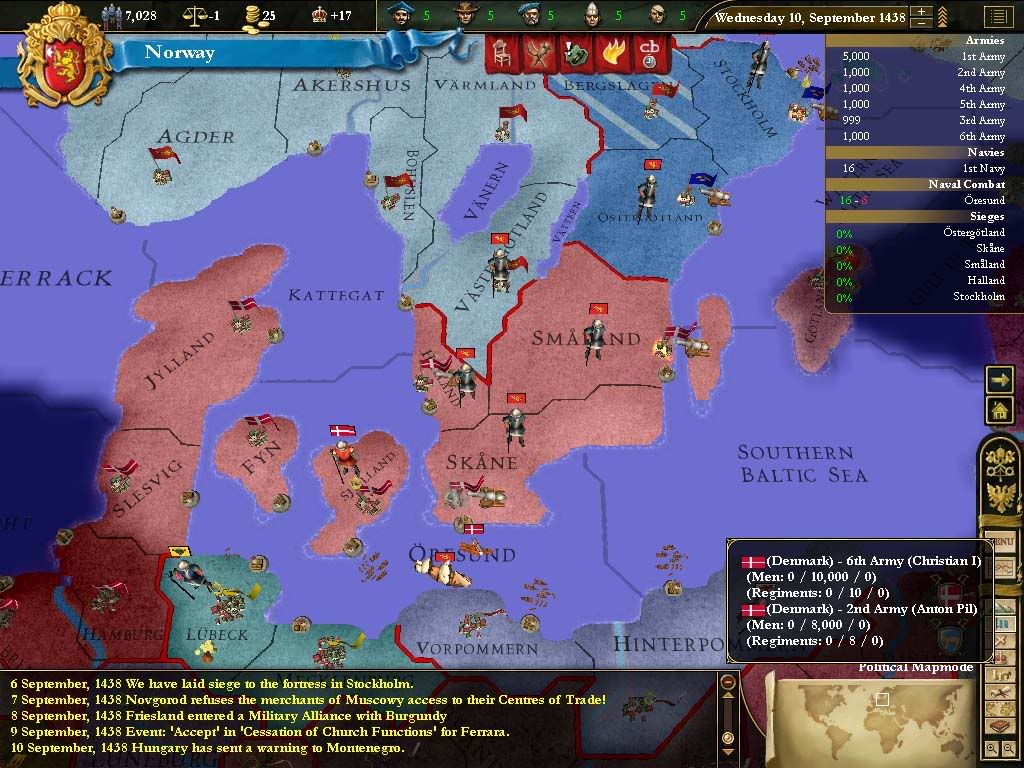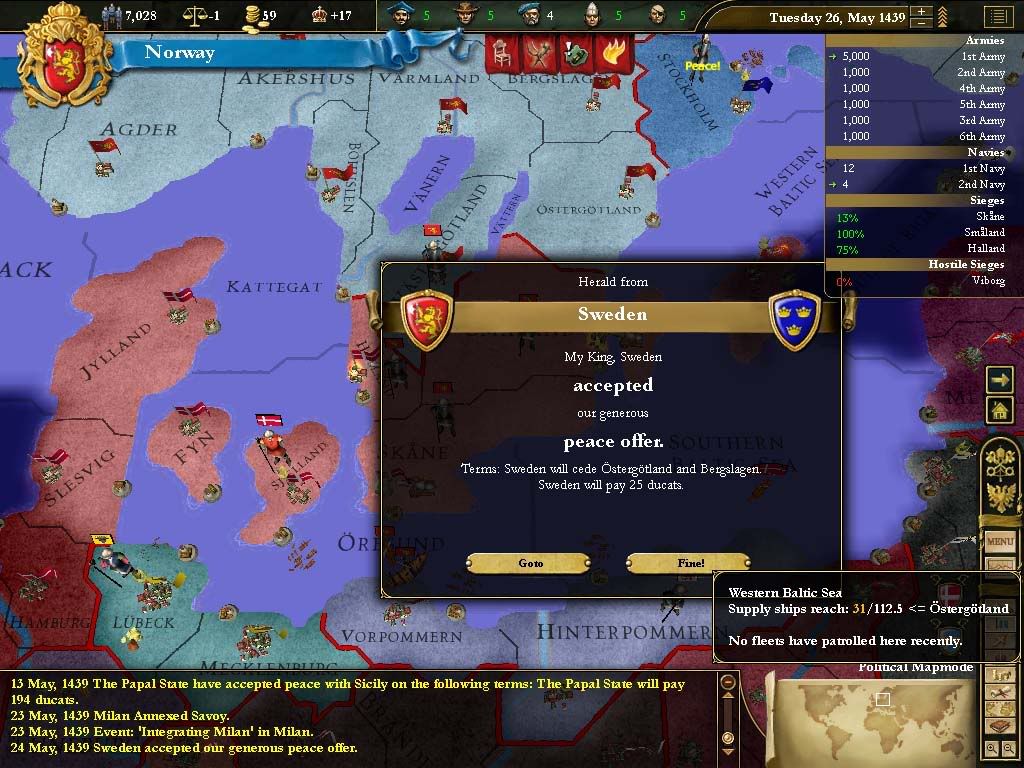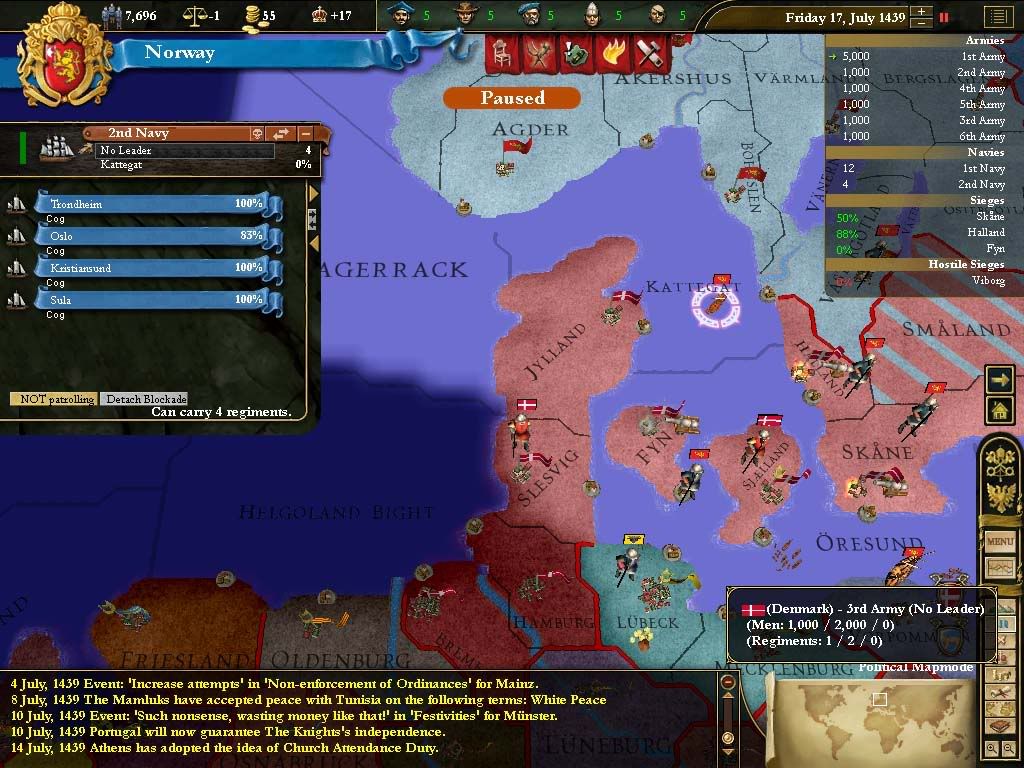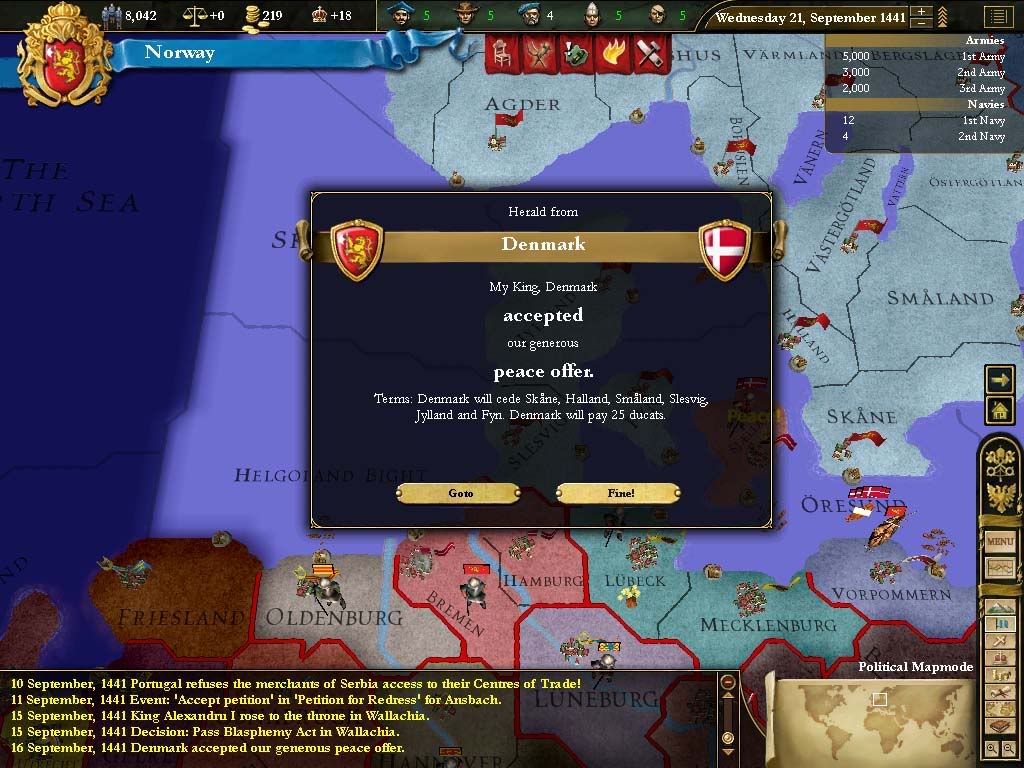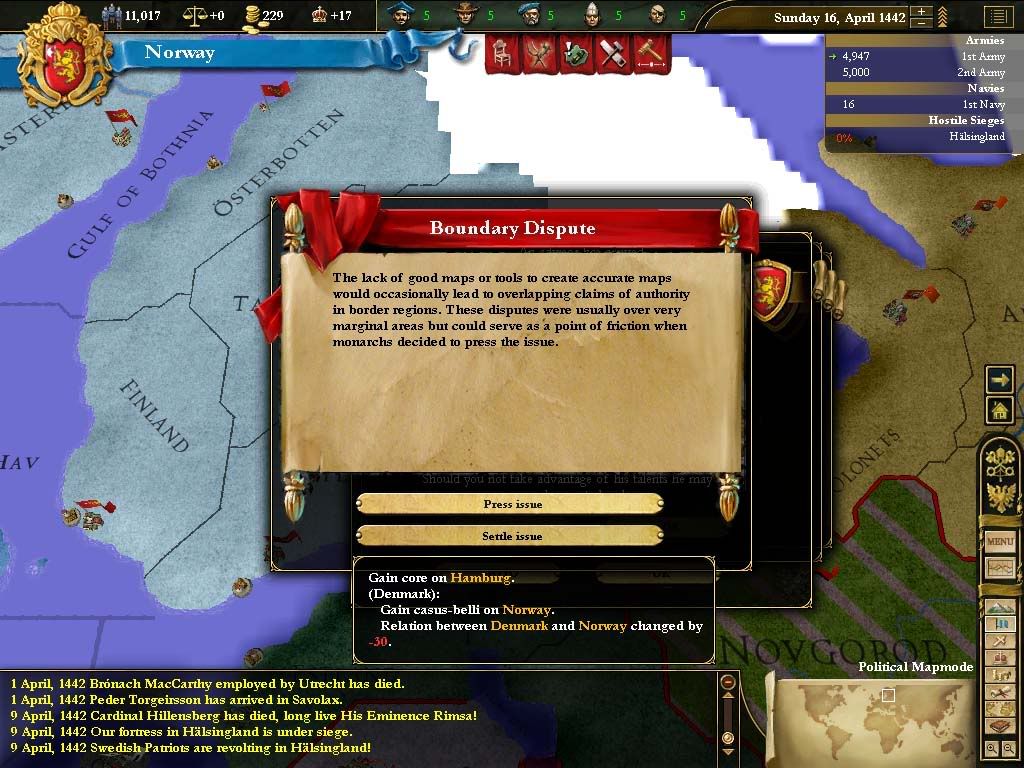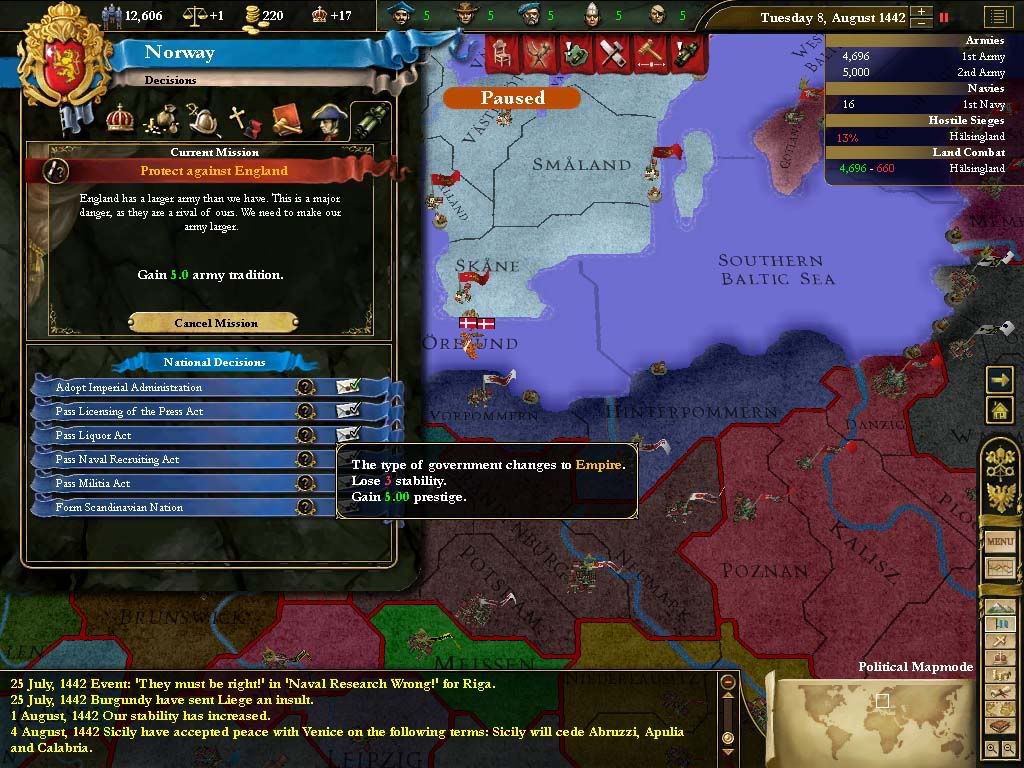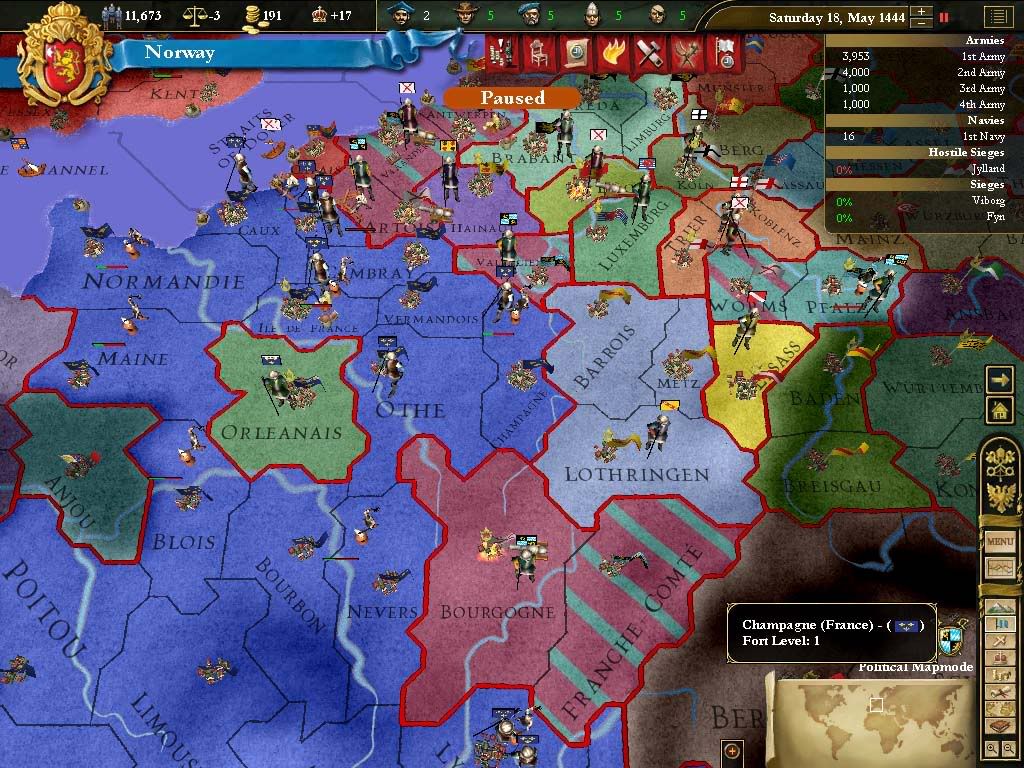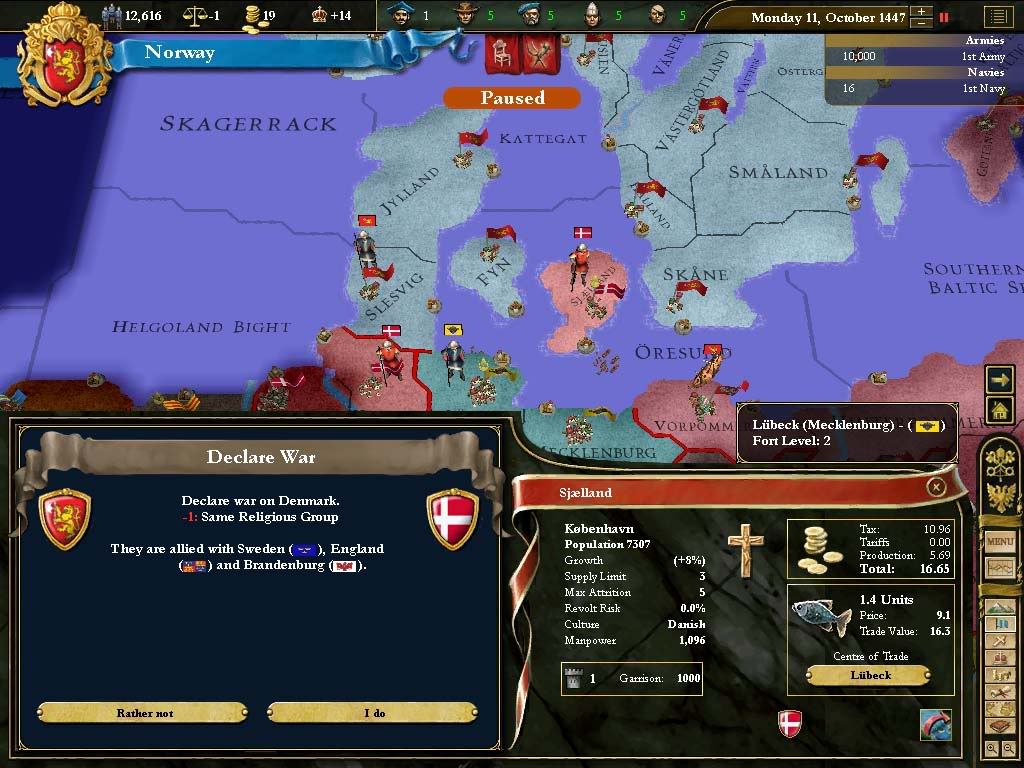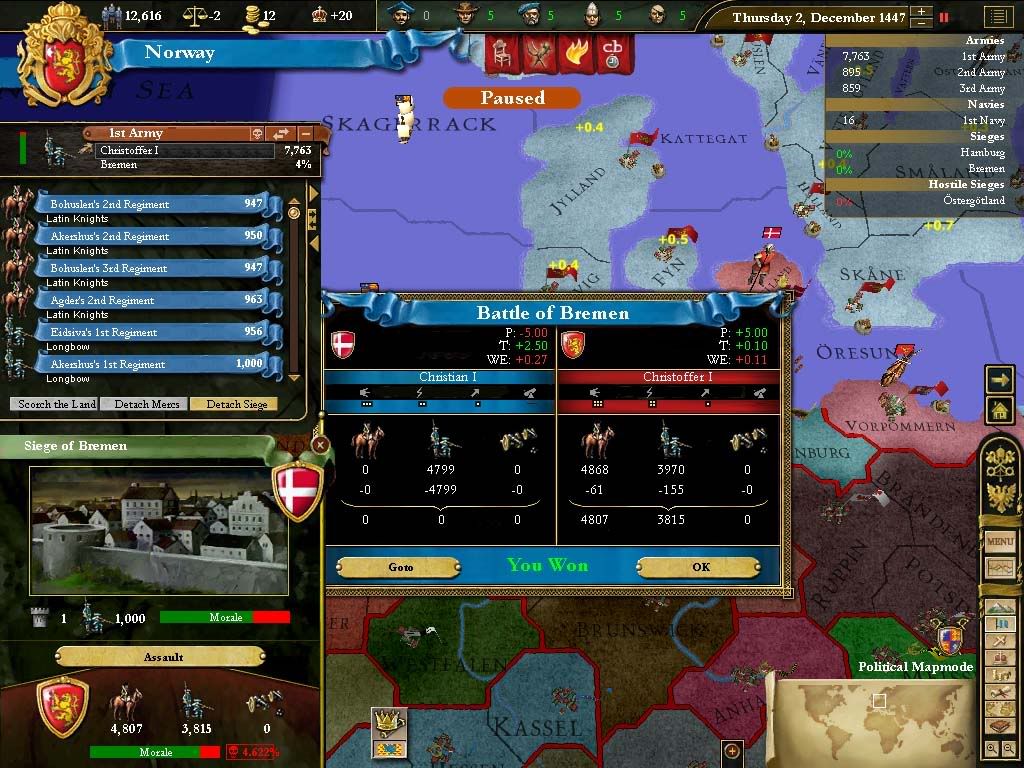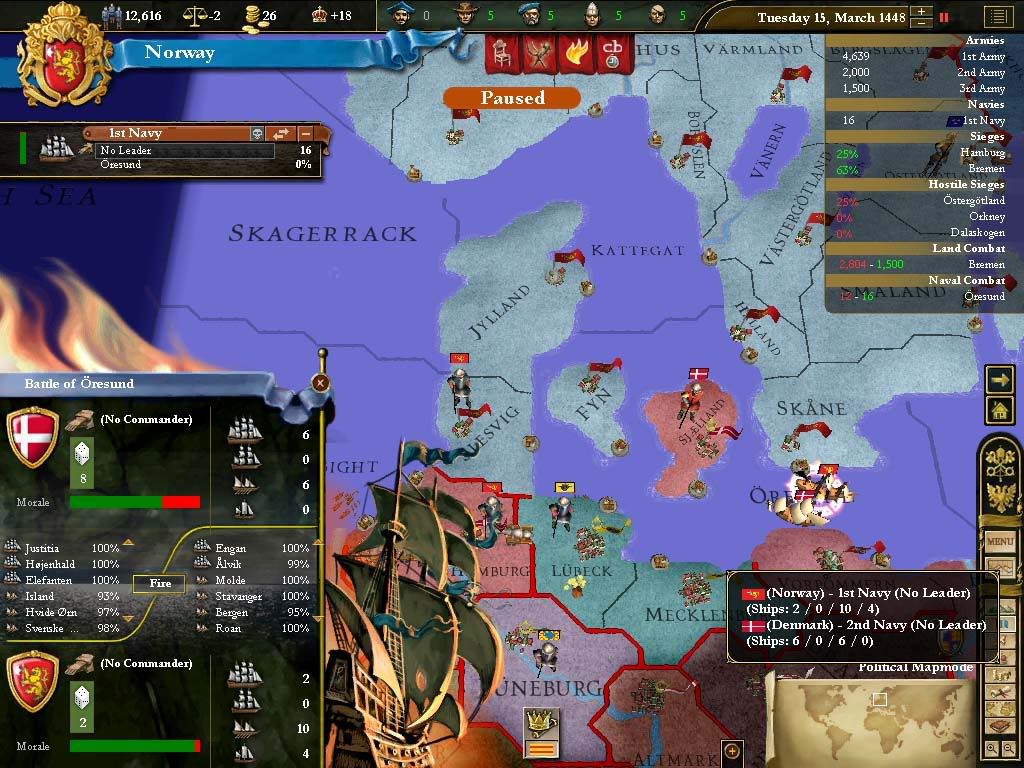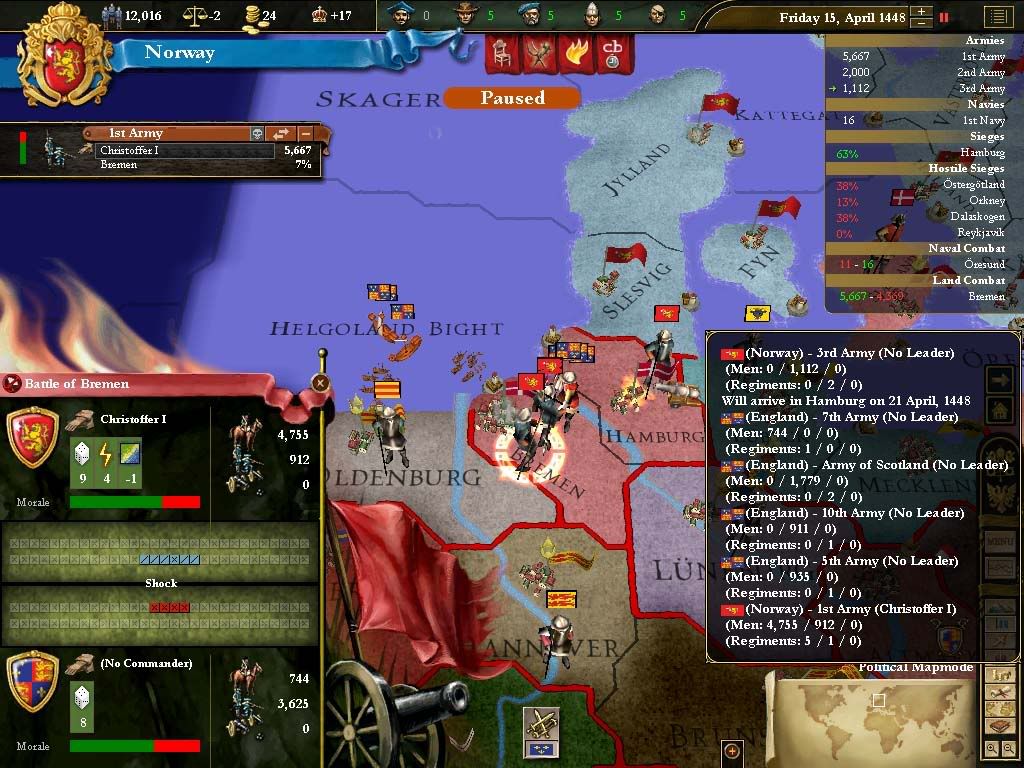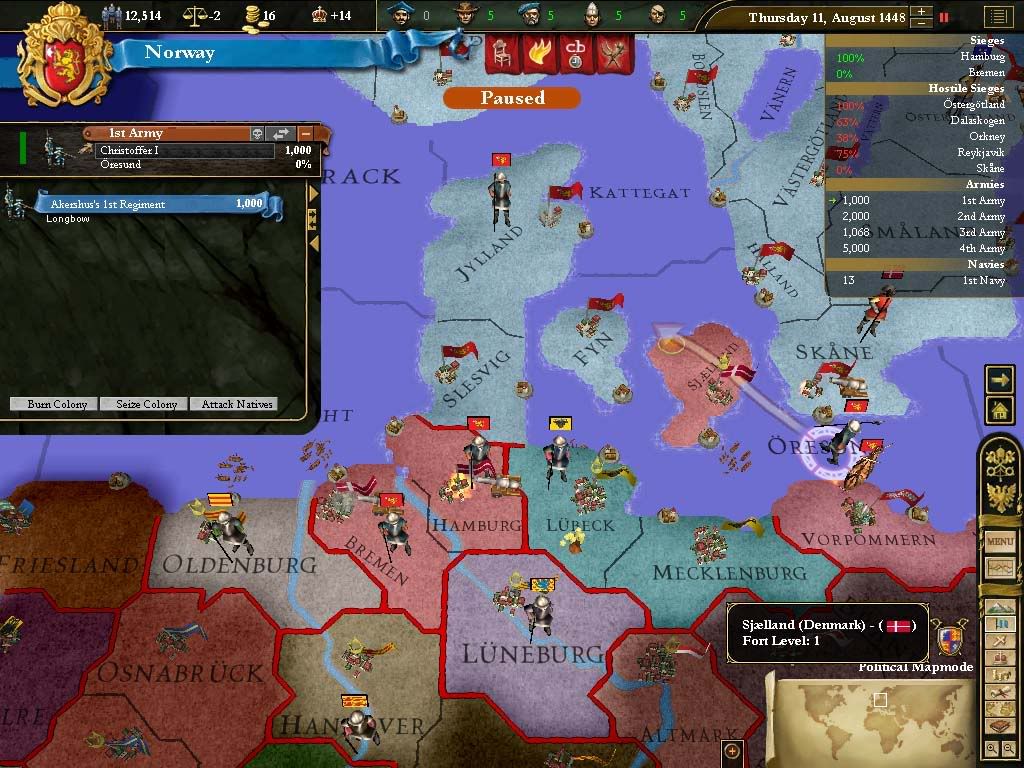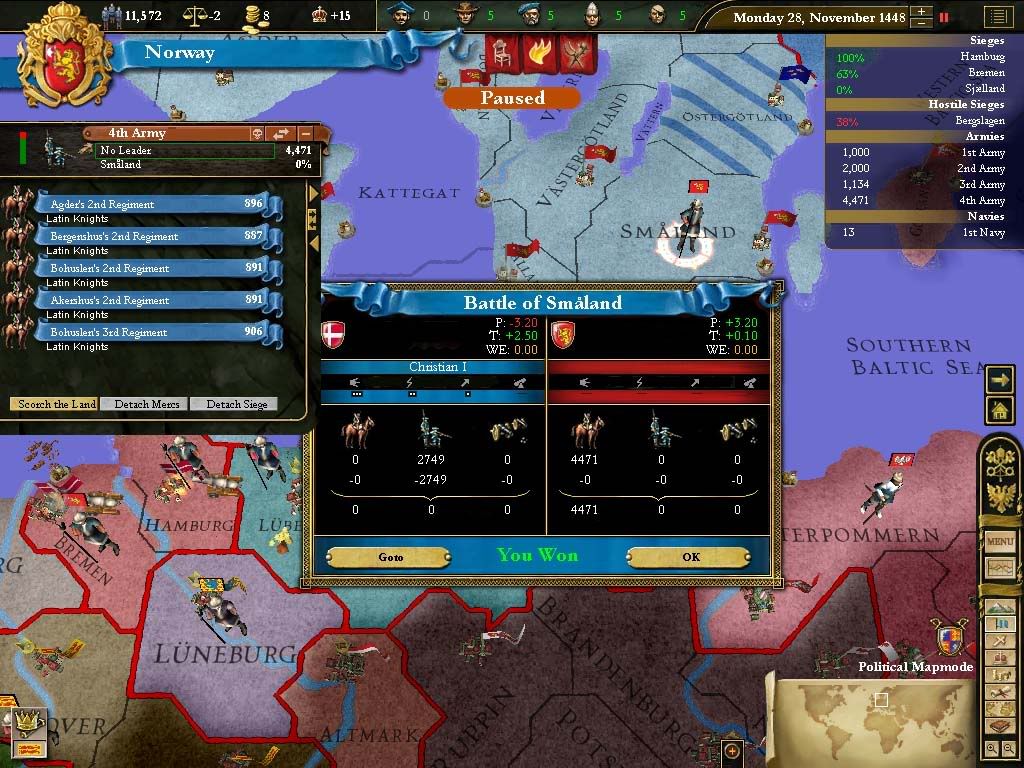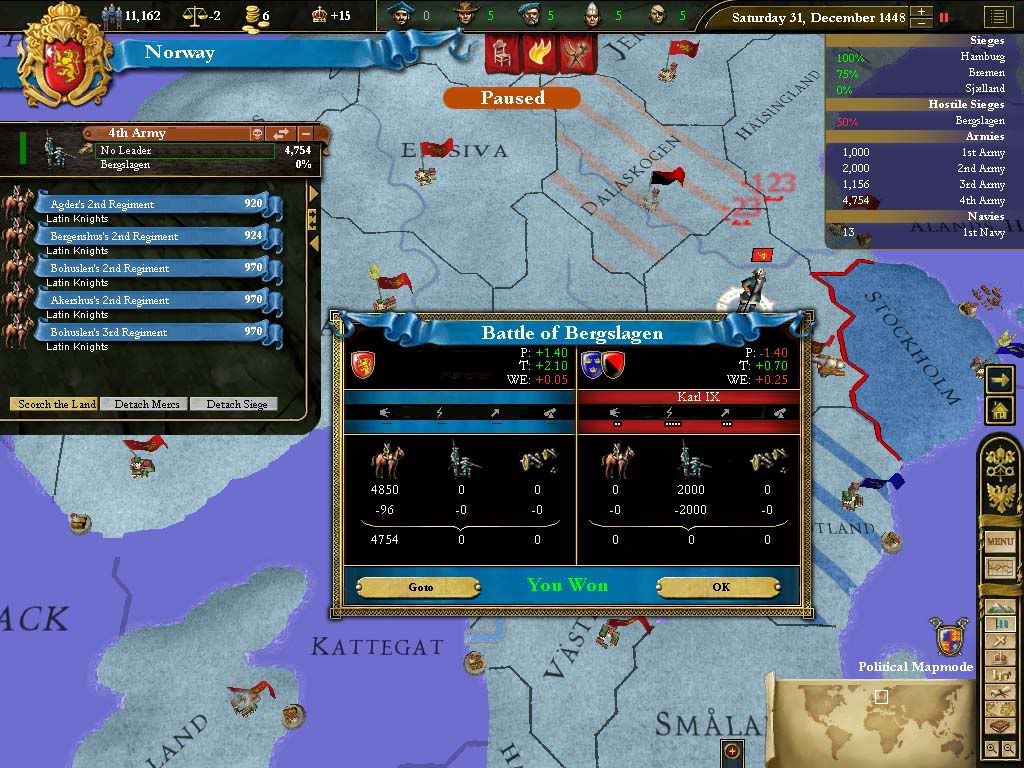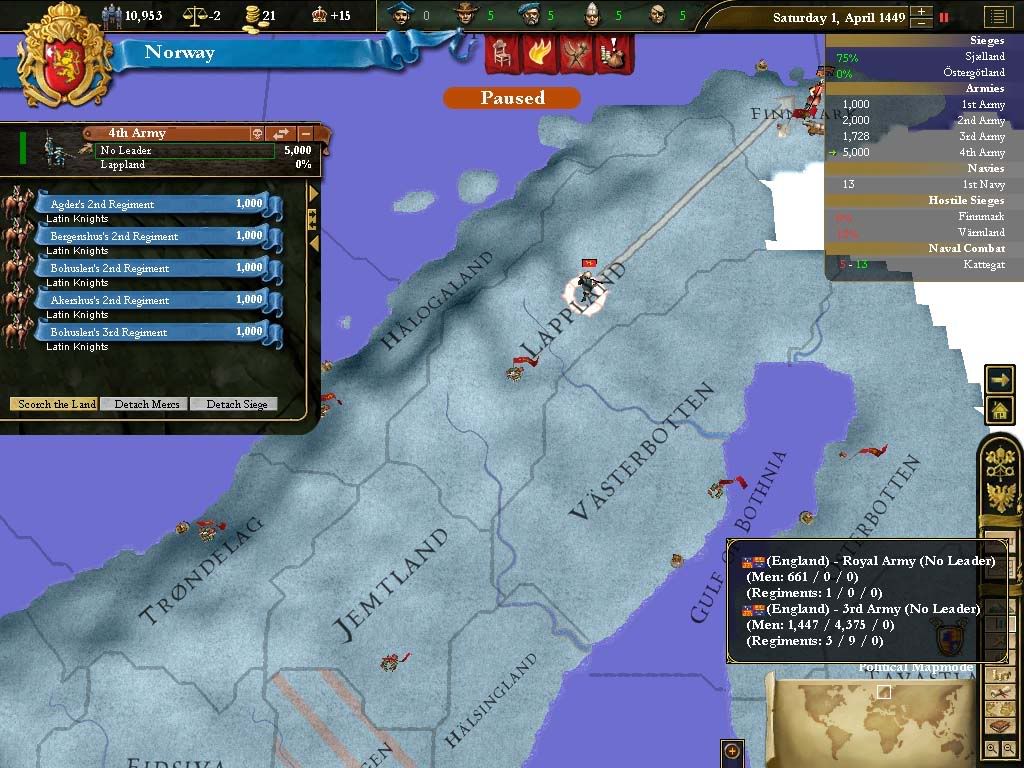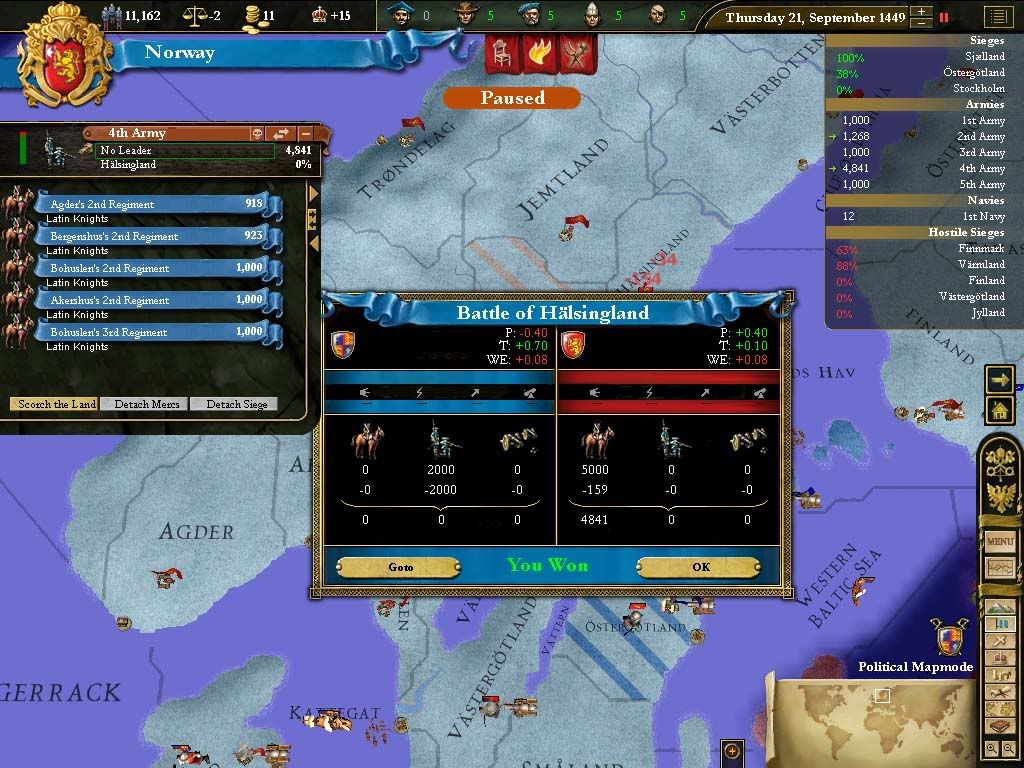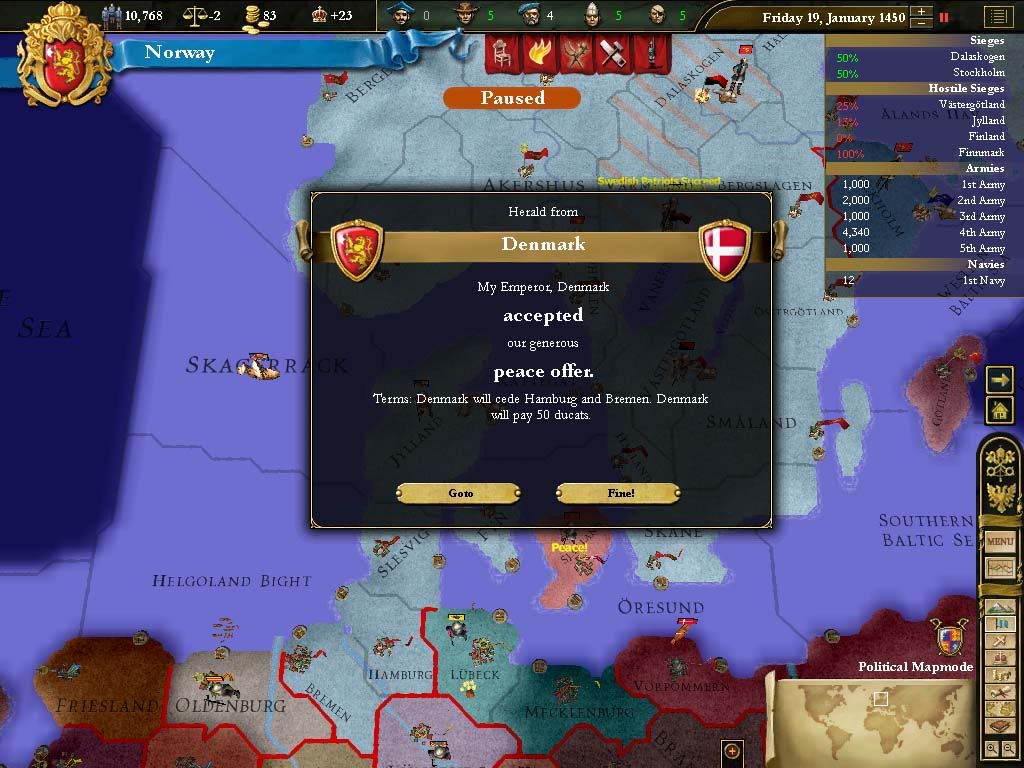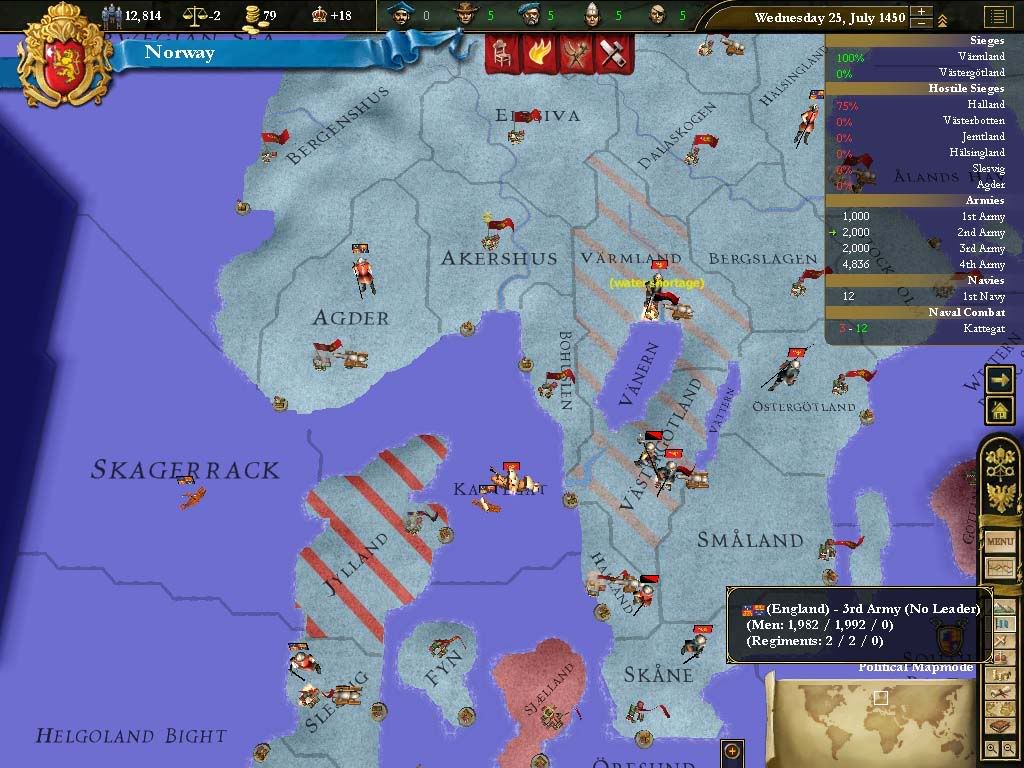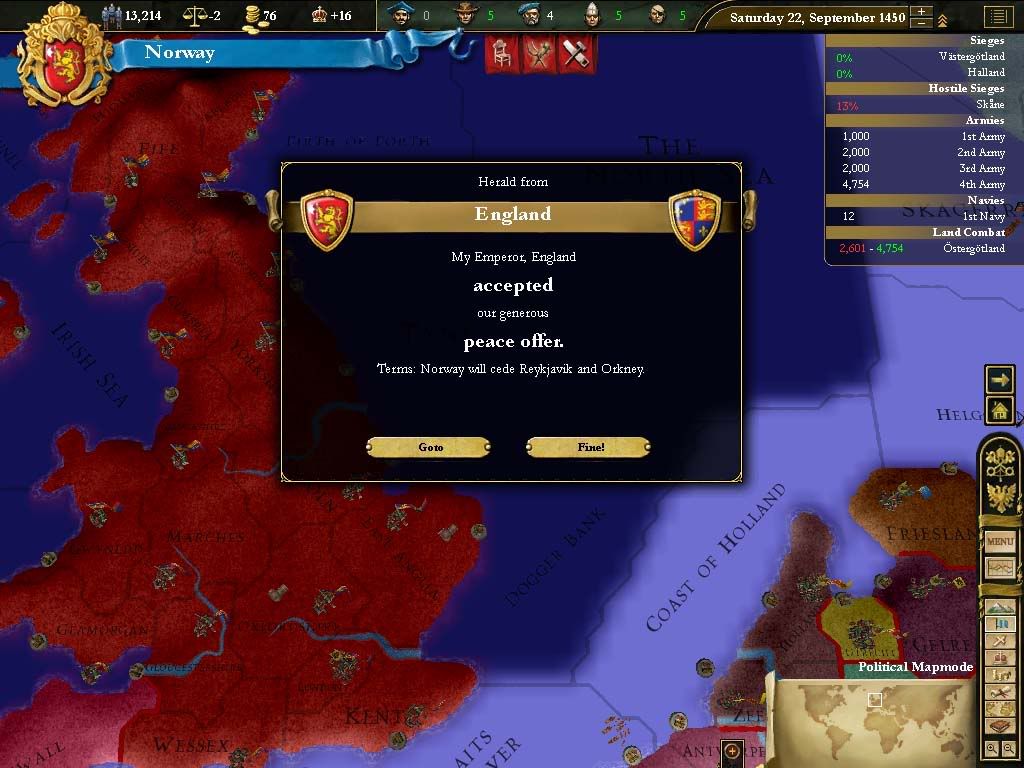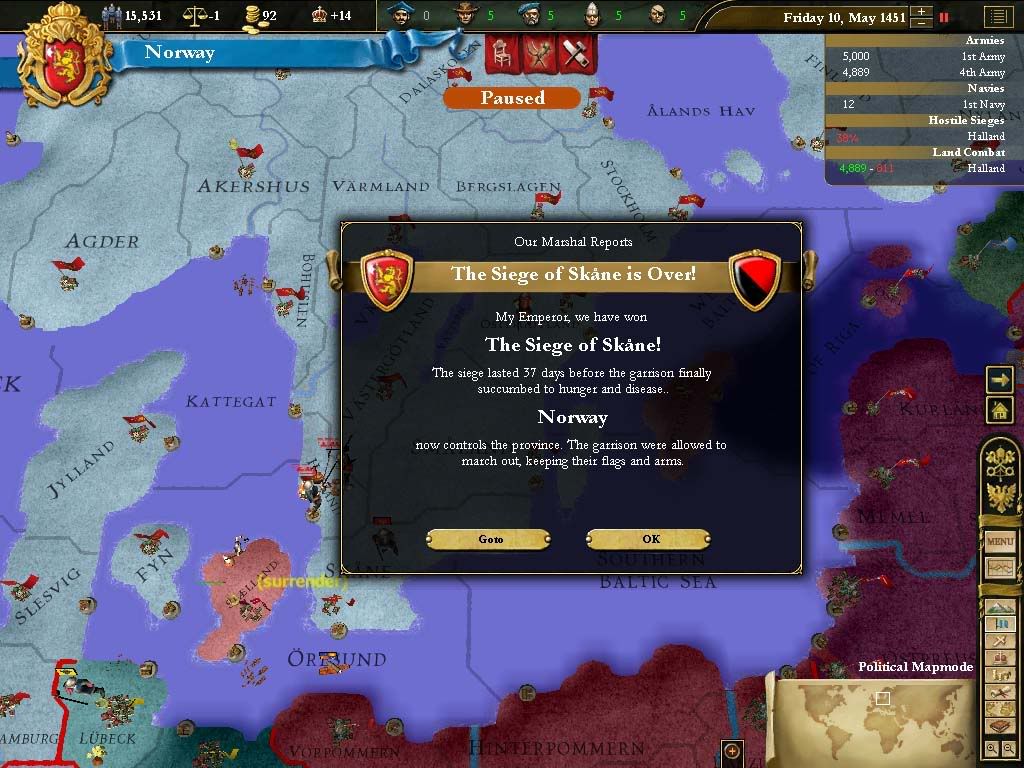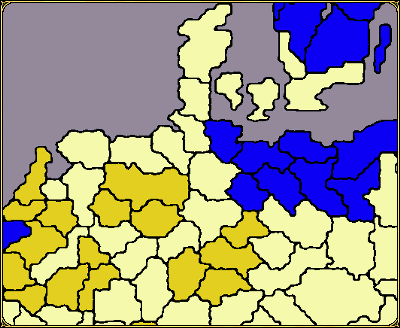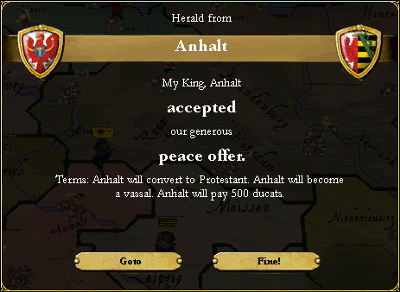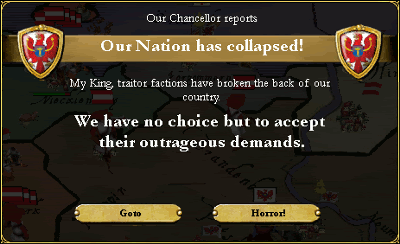Wien, 4 august 1815
In the conference room the two Austrian generals and an assistant are chattering.
Schwarzenberg: I do not understand. What's wrong with this 'Einstein'?
Assistant: Einstein has altert the present and changed the future.
Main screen turn on. The young Austrian queen is shown.
Maria Theresia II: A, good to see you generals. I have recieved your reports about the borders.
Karl: Good to hear. What do you think?
Maria Theresia II: France is still busy with Great Britain, so the Napoleontic threat is no longer of any concern.
Karl: Do you hear that? Our enemy France will soon be out of the way.
Maria Theresia II: Hold on, generals, I recieve an emergency transmission from our northern border.
The screen shows a frightened soldier.
Soldier: They're attacking! There are too many! We have to evacuate!
Maria Theresia II: Who is attacking?
Before the man can answer, the screen blurs: another transmission is overruling it.
Einstein: The imperial warmachine has been unleashed. Do not struggle against what is inevitable. All who stand in the way of our divine destiny will be swept away by the march of history. You will bow before us, or you will cease to exist.
The screen blurs again: the transmission is normal again.
Maria Theresia II: Generals, it apears that the kingdom has mounted a full-scale assault.
Karl: What kingdom?
Maria Theresia II: The kingdom of Westphalia of course.
Assistant: We now have
two mortal enemies?
Schwarzenberg: Unleash our nuclear weapons! Annihilate them all.
Maria Theresia II: Excuse me, general?
Schwarzenberg: Our nuclear weapons? Our atomic bombs?
Assistant: Don't you understand? This is 1815, and even with Einstein here, they won't be invented for another 130 years. Even now he has altered the space-time continuum! Ohhhh who knows what nightmares he has created.
All look fearfull at eachother.
Cool intro music.
Welcome to the final chapter of Westphalia Alert. Previously Einstein travelled back through time to prepare the kingdom of Westphalia for German dominance. In order to prevent Hitler from rising to power he wanted to defeat Prussia, to distort their dominance on the German history, and defeat Austria: if they are no large power in the early 20th century, history might all turn out quite differently.
Now that Prussia is practically out of the way, it is time to face Austria. Of course, Gauss will continue to spawn more men. The next war will start in Hamburg. The question remains: will Westphalia be able to defeat the Austrians, and even better: destroy that country, so that it won't be a great power anymore?
Scott: Euhm... Einstein? King? Did ya anticipate a war with
four countries?
Einstein: What do you mean?
Scott: Well... Hamburg was not only guarenteed by Austria, and Prussia, but was also allied with Denmark. And we have no friends. All abandoned us long ago.
Einstein: Gauss! Please explain!
Gauss: There isn't much to explain. Scott here has already told the situation. But if you want to know why... Well, of course we knew all this. But we will overrun Hamburg, and Denmark and Prussia have enormous high war exhaustions. They will be glad to prematurely end this war. On our conditions. And then it's up to Austria and us.
Einstein: That seems doable. Well, let's first have a look at Hamburg. We were approaching it from four different directions.
Scott: Watch out matey! Prussia attacks Ratibor!
Gauss: Yes, yes... That was a diversion province anyway. We'll take it back, don't worry. Anyway, it took is not much time to defeat their army: our force wasn't even assembled fully there when they dropped dead already. It didn't take long to occupy their country then, and annex it.
Scott: Yay!
The war made a good start. Hamburg was literally overrun by the many Westphalian forces. With the first of the four out of the way, the attention shifted to the next in line: the one country that stood between Westphalia and Austria: Prussia.
Einstein: Ja, ja, skip the drama, we're going to war!
Gauss: Actually, we're already...
Scott: Ya and ya preciseness! Com'on, let there be some
drama! Some... some... Aye, has anyone seen tha Stolberg?
Einstein: Hm... no, actually, I haven't seen him for a while. Not since the moment he threatened to kill you.
Scott: Euhm... Let's hope he stays away for a while then. If he kills me, it would make me a
sad panda
Gauss: No, it would make you dead. Definately very dead.
Scott: Aw com'on laddy!
Drama!
While the three men were bickering, the war continued. The Prussians had occupied Ratibor, and then continued to the north, to Brandenburg. But they got help from Austrian forces, who claimed that province. And the Austrians pressed on. Potsdam and Ruppin were soon under siege. But the Westphalians ignored that. They continued with their usual tactic: occupy the country before they can do something dangerous. And thus the army went to Hinterpommern. There it split up: A part marched in the direction of Memel, while the larger chunk was going for Neumark and Breslau.
Einstein: Don't forget the north...
Good point! There was a threatening situation in Scandinavia: Danish men were going to invade the Westphalian provinces. So the cavalery was send to the high north, to quickly end this madness. The only bad thing was that this long run made the country decline a little bit. But well, the loss in technology investment wasn't missed. And in the meantime the fleet went back to the Öresund. Once again the portal to the East sea was occupied.
Einstein: So, we've got 75 percent of the small nation of Prussia already occupied, and with our men going to Memel we will soon have them all!
Gauss: Those men going east are actually unnessecary. We won't have to occupy their capital. We won't get any more provinces by doin that.
Einstein: No?
Gauss: No. We can now already demand the maximum. So let's not waste any more time and concentrate on the important thing: beating Austria.
Einstein: Good thinking! I'll quickly demand Neumark, Breslau and some money and move the men through Poland to the eastern border of Austria.
And so it happens that within a few months the war is already partially won: two of the four enemies are beaten. Two more to go.
But before we continue, a message boy wanders towards Einstein and gives him a few messages:
Scott: What's it, matey?
Einstein: Didn't you say that with the previous message too?
Scott: Hey, don't blame my repetition! Just show us tha messages!
Einstein: Ja, ja... It's once again a rise of stability, which is good due to our drop at the beginning of the war. There is no more
The March! in Bremen. And apparently we didn't know entire China before now... And guess what... We can move the slider once again! How unexpected.
Gauss: We must give the Aristocracy more power. By the way, you
did promise us titles...
Einstein: That's good. As long as you continue to serve the military, I'll make you
Duke of Earl. This more aristocratic way boosts our army tradition a lot.
Scott: But... If ya promised all of us titles... Did you promise Stolberg tha too?
Einstein: Of course.
Scott: Arrrrgh! O no! Stolberg will come for me! I must do something! Protect me! Help, my oh my, what can I do now?
Einstein: Ok, ok, I'll spend some 100 ducats on armor to protect you. Now, please be quiet, for real men are going to war! Let's now focus on Denmark and remove another opponent from the war. Come Gauss, lead the army to victory in the north!
Gauss: The Danish posed absolutely no thread. The only problem was the distance. The men were underway to the high north anyway, so they proceeded. Until we heared that there was a rebellion in Bergenshus. Those rebels formed a greater thread than the entire Danish army! We really smashed them well during the previous war. But anyway, we split the northwards going army: half went back south, to smash that rebellion.
Einstein: Good riddance! It must be our high war exhaustion that spawned those rebel scum.
Gauss: Quite possible. But while our men were fighting in the north, I sended some to the Danish capital too. It took them longer, but finally they managed to occupy that province. Now all the Danish mainland provinces are under our control.
Einstein: But what about the islands? Iceland and Greenland? We can't reach them.
Gauss: Indeed. That posed a problem. Despite the fact that we agreed not to invest in the navy, I
did build two transport ships. So I was able to transport two thousand men to the islands. I travelled then back and picked up another two thousand. For there was one regiment of men in Iceland, and one in Greenland. The last Danish resistance...
Einstein: I can savely assume you defeated them?
Gauss: Yes, but it took quite some time. By the end of 1817 Iceland was occupied. And then the same thing had to happen to Greenland: the long transports to the west.
Gauss: It took us till march 1818 to reach and occupy the province of Vestbygden. Immediately we went back to fetch the other 2,000 men, awaiting in Iceland: the natives rised against us, and weakened our men. But then in june we assimilated the culture of that province, and moved on, to Eiriksfjord: the last free Danish province. The men posted there were easily beaten. And now, by the end of june 1818, we have entire Denmark in our hands.
Einstein: Good! Since the Greenlandish provinces were colonies, which we, of course, seized, we can now demand all of Danmark's provinces, along with their vassalization and their renouncation of quite a lot of claims of former provinces. The North Sea is ours!
Scott: Yay!
Einstein: I have only one question... One tiny question...
What happened to my men? I see only twelve thousand men! We started this war with a hundred thousand! Gauss...
Gauss: Don't look at me.
You left Scott in charge of the Austrian campaign while I was doing the Danish war.
Scott shifts nervously on his feet. He barely dares to look at king Einstein.
Scott: Well... the Austrians were deep in tha Westphalian territories. Ya should have seen how all tha provinces fell one by one! I sended tha main army into the heart of Austria, to occupy their provinces. Tha same tactic as Gauss matey here always uses, ya know. But then
he came... Stolberg!
Einstein: Scott has walked over to the Austrians?
Gauss: Actually that's not that surprising. He has good contact with the Austrian compinist Schubert, and well... Scott... You basically scared him away with you Ivanhoe.
Scott: Wasn't me! Awww... Crap. The only reason I'm standing here is for tha armor ya had bought me, Einstein. Because Stolberg came with an enormous army and shouted:
Stolberg: Silence! I kill you! Scott, you won't escape.
Scott: It was scary! O, have ya got new pantsies for me?
Both Gauss and Einstein step back from Scott.
Scott: Com'on guys! Drama! Anyway, tha army was split into a few divisions: one was coming from Poland, one from our just freed Ratibor and one was our cavalry coming form the high north. Tha austrians had one
huge, massive army, which walzed all over us! Before we could join tha armies, they were defeated. Of course, I got quite a lot of provinces occupied. But ya know? They took them back! Tha bastards!
Einstein: This is not good... Our army has been smashed and the only reason we are able to do something, is because Gauss is training more and more men. Our army is defeated in the Austrian homeland, and their forces are moving slowly forward, occupying our country province by province.
Scott: Wait! We get signal.
Einstein: What?
Main screen turn on.
Scott: It's ya!
Stolberg: How are you gentlemen. All your provinces will belong to us. You are on your way to destruction.
Gauss: What you say!
Stolberg: You have no chance to survive make your time. Ha ha ha ha!
Scott is shaking visibly.
Scott: King Einstein!
Gauss: Take off every Napoleonic Square!
Einstein: You know what you doing.
Gauss: Move Napoleonic Square! For great justice.
And so it happened that, while winning against three of the four opponents, Westphalia was actually losing the war against Austria.
Gauss: Ok, let's assess the situation. We've got 12,466 men, spread over Norway, Greenland and Westphalia. The Austrians got our eastern provinces, and are slowly marching towards us. Also, in Hamburg and Hannover there are rebels, while Westfalen is already occupied by them.
Scott: What can ya do?
Gauss: Our first priority must be to form an army to strike back. We must not think about destroying Austria now, but about surviving ourselves. Let's regroup in Fyn.
From all over the world the Westphalian forces were withdrawn to Fyn. While the men were beeing pulled back, the free Westphalian men in Norway were celebrating: they honoured Gauss for his military strategy.
Einstein: I'm glad I can bestow a bunch of honourable titles on you, Gauss.
Gauss: Yes, yes, please hurry up. The men must assemble, and the rebels will never negotiate, and the Austrians are overwhelming our mainland.
It took in total a whole year to assemble. On 1 july 1819 all the men were finally in Fyn. 28,000 Westphalian soldiers.
Gauss: Quite dissappointing, after the army where we started with. But well, we have to do it with this. Of course, I'll continue to train men in Norway. Those vikings are really great warriors. Especially equiped with Gauss rifles.
Scott: If one can save us, it be ya! Save us, Carl Friedrich Gauss, you're our only hope!
Gauss: Well, I'll let our threedeckers guard the Öresund: that way the Austrians can't go to Scandinavia. And we'll be able to guerilla our way back to the mainland. For now: I'll sound a general
Call to Arms. We will prevail,
we will survive.
The Asutrians pressed on. While rebels were ravaging along the Westphalian homelands, they were moving their armies from province to province. Altmark, Lüneburg, Brunswick... they all fell. But what the Austrians didn't have, was military access through Mecklenburg. Westphalia did had that. So while rebels were laying siege on Hamburg, thus blocking the way to the northern provinces, Gauss his army could sneak past the Austrians through Mecklenburg.
Slowly but surely Gauss led his men through the occupied territories of Westphalia. All the small armies he encoutered were murdered to the last man. No-one was left alive. But he left the provinces to the Austrians. He needed the men for destroying Austrians, not for freeing civilians.
The march of Gauss' army continued through the occupied lands. They saw the horrors of occupation, but continued. Then they entered the Austrian homeland and smashed more Austrians. And staretd to occupy themselves. On their way they smashed more and more Austrians, untill there were no more opposing forces in this country. And the Austrian main army, the one that had destroyed the previous Westphalian army? They remained in Westphalia, fighting against rebels, and trying to occupy the provinces! Gauss clearly did a better job, by going for the provinces with level 1 and level 2 forts.

One province after anotehr fell. Almost half of Austria was now occupied, inclusing their two trade centers ánd two gold mines. The Austrian economy couldn;t handle this situation much longer. The war score had changed from -19 % to 46 %.
And then it became 2 februari 1821. The last free day of the game.
Scott: Oy Nutter! We need to end tha war now, or ya won't get another chance.
Gauss: No! The tactic was going to work, we were going to completely destroy Austria! Now it is too late. Too late...
Einstein: It is a sad day. But don't cry, you've managed to get us out of the missery we were in. Let's demand what's possible.
Einstein demanded three provinces and 25 ducats. Among those provinces was Görz, one of the two Austrian gold-provinces, and their sole harbor. Now the Austrians faced an enormous drop in their income, and no access to their few colonies in Africa.
Westphalia faced a few rebels. But that was not something they couldn't handle. Not after this war.
Then the next day came. Einstein saw a bright light, and a single message:
Slowly the light fades away. Einstein is once again sitting in the chair of his old laboratory.
Assistant: Did you find him?
Einstein: Prussia... Is out of the way.
Assistant: Congratulations, professor! With Prussia removed...
Einstein raises his hand, and the assistant falls silent.
Einstein: I left Austria still as a great power. I hope that the smack I gave them was enough to prevent Hitler from rising. Time will tell. Sooner or later, time will tell.
The End














